Assignment on Entrepreneurship
VerifiedAdded on 2022/12/21
|20
|8588
|76
AI Summary
This assignment provides an overview of entrepreneurship and the entrepreneurial journey. It discusses the traits of successful entrepreneurs and explores the Timmons Model of Entrepreneurship. The assignment also covers the concept of opportunity and the resources required for entrepreneurship.
Contribute Materials
Your contribution can guide someone’s learning journey. Share your
documents today.
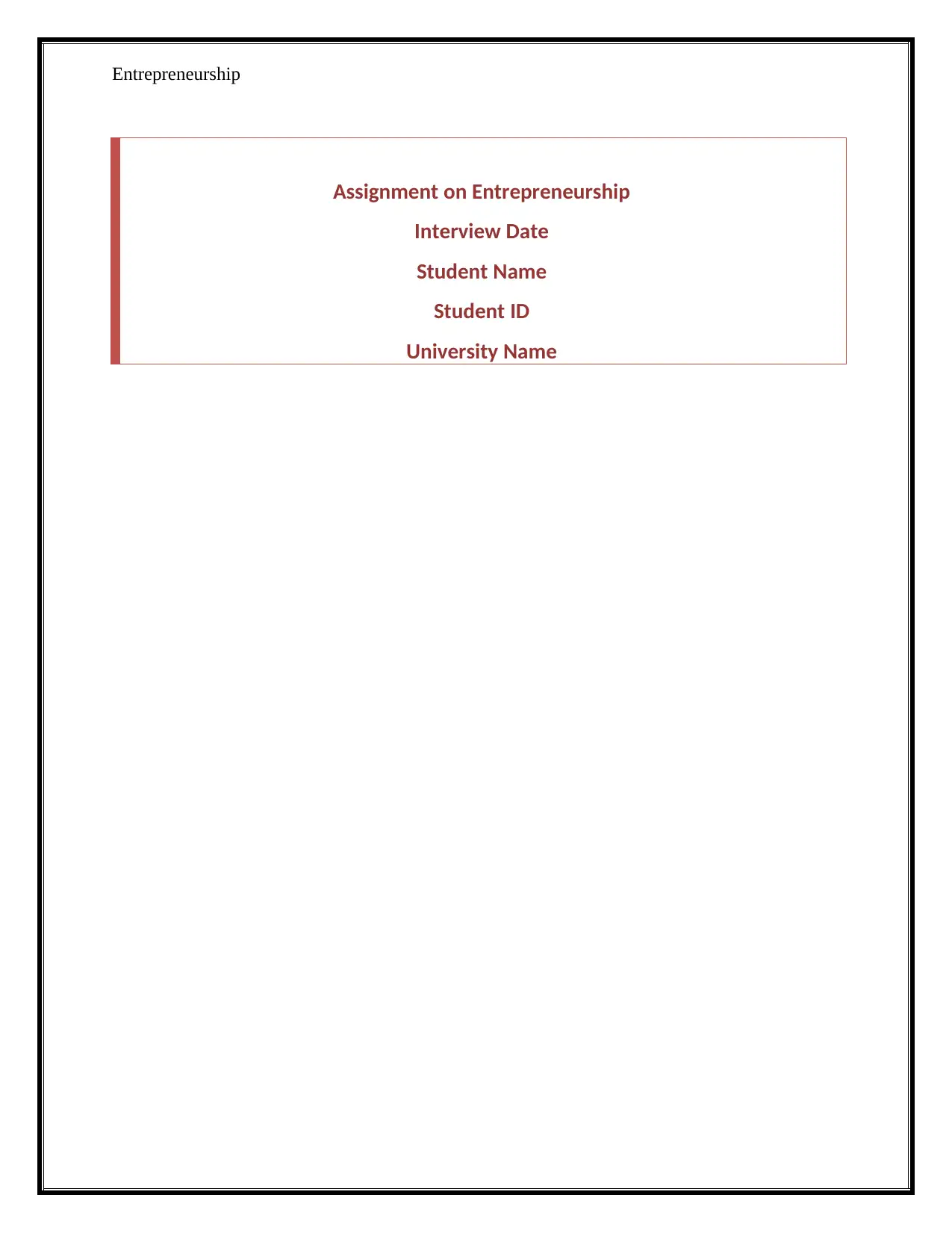
Entrepreneurship
Assignment on Entrepreneurship
Interview Date
Student Name
Student ID
University Name
Assignment on Entrepreneurship
Interview Date
Student Name
Student ID
University Name
Secure Best Marks with AI Grader
Need help grading? Try our AI Grader for instant feedback on your assignments.
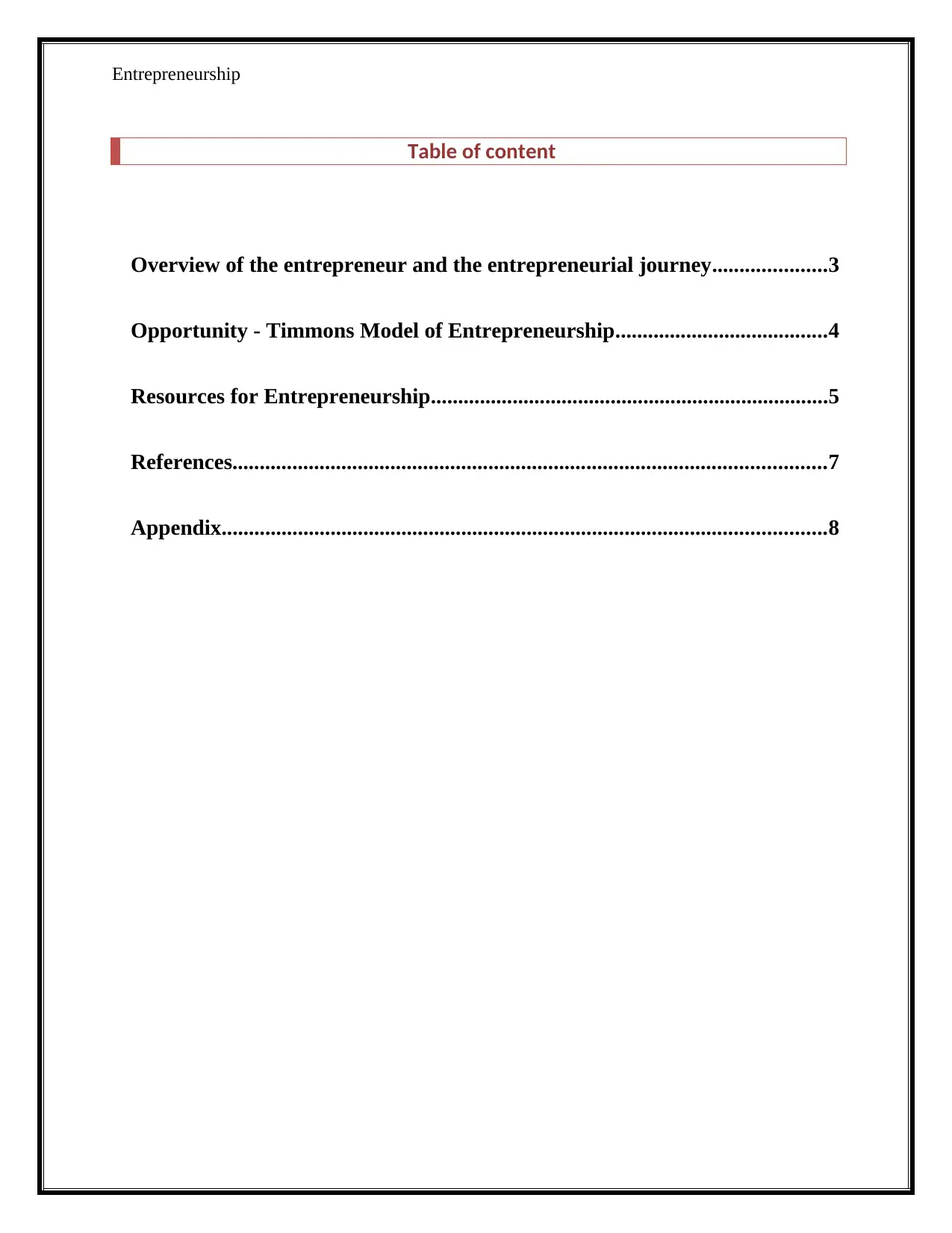
Entrepreneurship
Table of content
Overview of the entrepreneur and the entrepreneurial journey.....................3
Opportunity - Timmons Model of Entrepreneurship.......................................4
Resources for Entrepreneurship.........................................................................5
References.............................................................................................................7
Appendix...............................................................................................................8
Table of content
Overview of the entrepreneur and the entrepreneurial journey.....................3
Opportunity - Timmons Model of Entrepreneurship.......................................4
Resources for Entrepreneurship.........................................................................5
References.............................................................................................................7
Appendix...............................................................................................................8
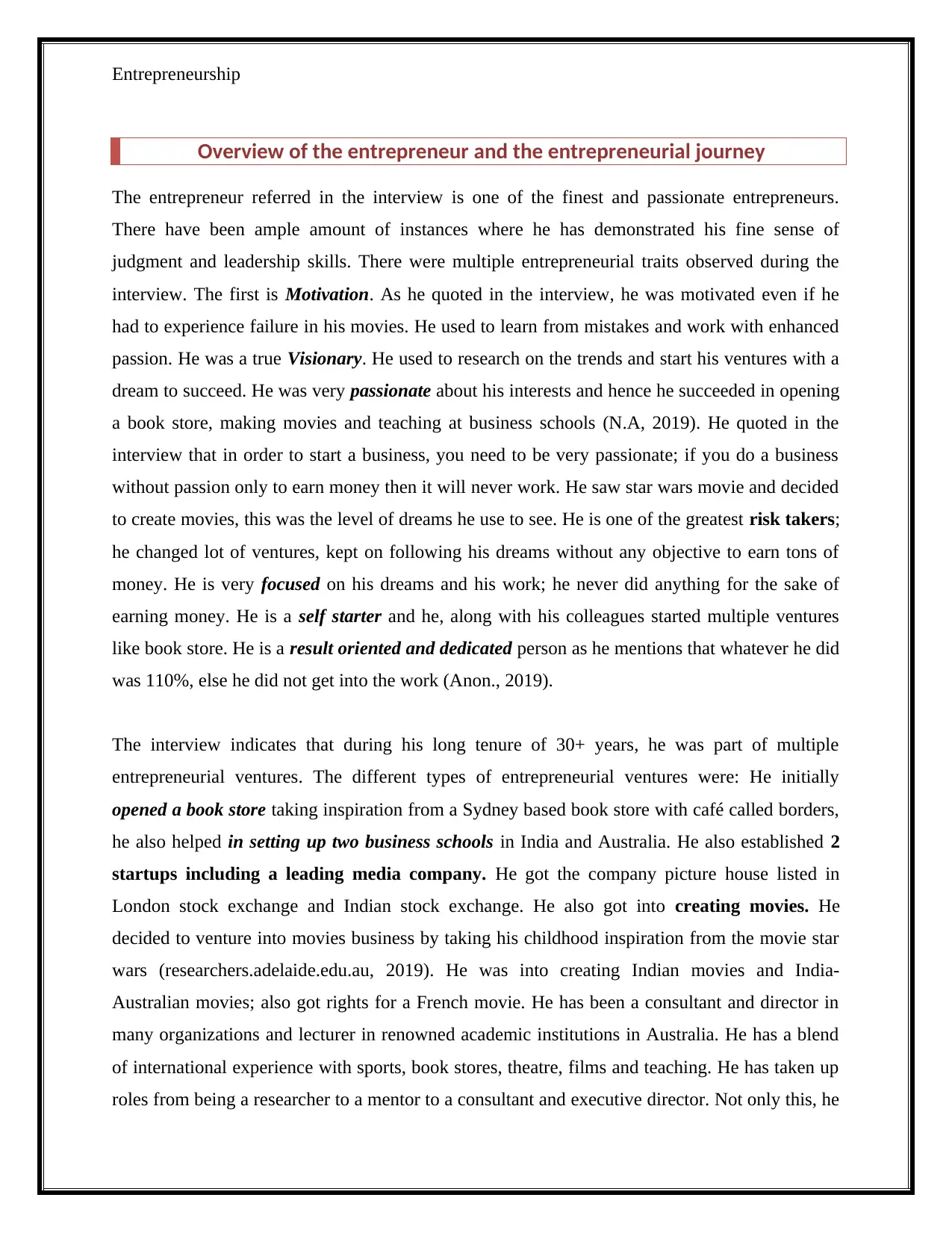
Entrepreneurship
Overview of the entrepreneur and the entrepreneurial journey
The entrepreneur referred in the interview is one of the finest and passionate entrepreneurs.
There have been ample amount of instances where he has demonstrated his fine sense of
judgment and leadership skills. There were multiple entrepreneurial traits observed during the
interview. The first is Motivation. As he quoted in the interview, he was motivated even if he
had to experience failure in his movies. He used to learn from mistakes and work with enhanced
passion. He was a true Visionary. He used to research on the trends and start his ventures with a
dream to succeed. He was very passionate about his interests and hence he succeeded in opening
a book store, making movies and teaching at business schools (N.A, 2019). He quoted in the
interview that in order to start a business, you need to be very passionate; if you do a business
without passion only to earn money then it will never work. He saw star wars movie and decided
to create movies, this was the level of dreams he use to see. He is one of the greatest risk takers;
he changed lot of ventures, kept on following his dreams without any objective to earn tons of
money. He is very focused on his dreams and his work; he never did anything for the sake of
earning money. He is a self starter and he, along with his colleagues started multiple ventures
like book store. He is a result oriented and dedicated person as he mentions that whatever he did
was 110%, else he did not get into the work (Anon., 2019).
The interview indicates that during his long tenure of 30+ years, he was part of multiple
entrepreneurial ventures. The different types of entrepreneurial ventures were: He initially
opened a book store taking inspiration from a Sydney based book store with café called borders,
he also helped in setting up two business schools in India and Australia. He also established 2
startups including a leading media company. He got the company picture house listed in
London stock exchange and Indian stock exchange. He also got into creating movies. He
decided to venture into movies business by taking his childhood inspiration from the movie star
wars (researchers.adelaide.edu.au, 2019). He was into creating Indian movies and India-
Australian movies; also got rights for a French movie. He has been a consultant and director in
many organizations and lecturer in renowned academic institutions in Australia. He has a blend
of international experience with sports, book stores, theatre, films and teaching. He has taken up
roles from being a researcher to a mentor to a consultant and executive director. Not only this, he
Overview of the entrepreneur and the entrepreneurial journey
The entrepreneur referred in the interview is one of the finest and passionate entrepreneurs.
There have been ample amount of instances where he has demonstrated his fine sense of
judgment and leadership skills. There were multiple entrepreneurial traits observed during the
interview. The first is Motivation. As he quoted in the interview, he was motivated even if he
had to experience failure in his movies. He used to learn from mistakes and work with enhanced
passion. He was a true Visionary. He used to research on the trends and start his ventures with a
dream to succeed. He was very passionate about his interests and hence he succeeded in opening
a book store, making movies and teaching at business schools (N.A, 2019). He quoted in the
interview that in order to start a business, you need to be very passionate; if you do a business
without passion only to earn money then it will never work. He saw star wars movie and decided
to create movies, this was the level of dreams he use to see. He is one of the greatest risk takers;
he changed lot of ventures, kept on following his dreams without any objective to earn tons of
money. He is very focused on his dreams and his work; he never did anything for the sake of
earning money. He is a self starter and he, along with his colleagues started multiple ventures
like book store. He is a result oriented and dedicated person as he mentions that whatever he did
was 110%, else he did not get into the work (Anon., 2019).
The interview indicates that during his long tenure of 30+ years, he was part of multiple
entrepreneurial ventures. The different types of entrepreneurial ventures were: He initially
opened a book store taking inspiration from a Sydney based book store with café called borders,
he also helped in setting up two business schools in India and Australia. He also established 2
startups including a leading media company. He got the company picture house listed in
London stock exchange and Indian stock exchange. He also got into creating movies. He
decided to venture into movies business by taking his childhood inspiration from the movie star
wars (researchers.adelaide.edu.au, 2019). He was into creating Indian movies and India-
Australian movies; also got rights for a French movie. He has been a consultant and director in
many organizations and lecturer in renowned academic institutions in Australia. He has a blend
of international experience with sports, book stores, theatre, films and teaching. He has taken up
roles from being a researcher to a mentor to a consultant and executive director. Not only this, he
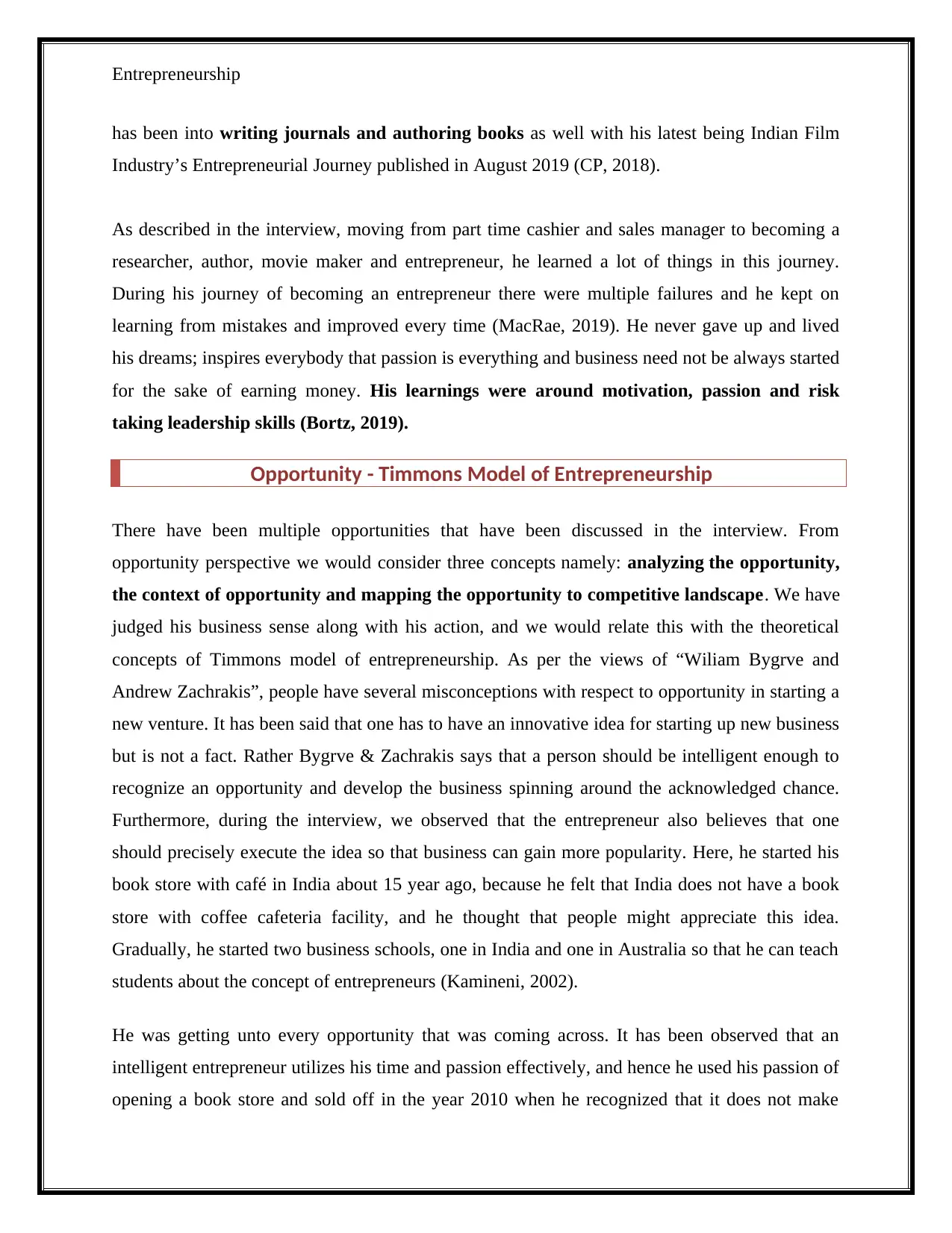
Entrepreneurship
has been into writing journals and authoring books as well with his latest being Indian Film
Industry’s Entrepreneurial Journey published in August 2019 (CP, 2018).
As described in the interview, moving from part time cashier and sales manager to becoming a
researcher, author, movie maker and entrepreneur, he learned a lot of things in this journey.
During his journey of becoming an entrepreneur there were multiple failures and he kept on
learning from mistakes and improved every time (MacRae, 2019). He never gave up and lived
his dreams; inspires everybody that passion is everything and business need not be always started
for the sake of earning money. His learnings were around motivation, passion and risk
taking leadership skills (Bortz, 2019).
Opportunity - Timmons Model of Entrepreneurship
There have been multiple opportunities that have been discussed in the interview. From
opportunity perspective we would consider three concepts namely: analyzing the opportunity,
the context of opportunity and mapping the opportunity to competitive landscape. We have
judged his business sense along with his action, and we would relate this with the theoretical
concepts of Timmons model of entrepreneurship. As per the views of “Wiliam Bygrve and
Andrew Zachrakis”, people have several misconceptions with respect to opportunity in starting a
new venture. It has been said that one has to have an innovative idea for starting up new business
but is not a fact. Rather Bygrve & Zachrakis says that a person should be intelligent enough to
recognize an opportunity and develop the business spinning around the acknowledged chance.
Furthermore, during the interview, we observed that the entrepreneur also believes that one
should precisely execute the idea so that business can gain more popularity. Here, he started his
book store with café in India about 15 year ago, because he felt that India does not have a book
store with coffee cafeteria facility, and he thought that people might appreciate this idea.
Gradually, he started two business schools, one in India and one in Australia so that he can teach
students about the concept of entrepreneurs (Kamineni, 2002).
He was getting unto every opportunity that was coming across. It has been observed that an
intelligent entrepreneur utilizes his time and passion effectively, and hence he used his passion of
opening a book store and sold off in the year 2010 when he recognized that it does not make
has been into writing journals and authoring books as well with his latest being Indian Film
Industry’s Entrepreneurial Journey published in August 2019 (CP, 2018).
As described in the interview, moving from part time cashier and sales manager to becoming a
researcher, author, movie maker and entrepreneur, he learned a lot of things in this journey.
During his journey of becoming an entrepreneur there were multiple failures and he kept on
learning from mistakes and improved every time (MacRae, 2019). He never gave up and lived
his dreams; inspires everybody that passion is everything and business need not be always started
for the sake of earning money. His learnings were around motivation, passion and risk
taking leadership skills (Bortz, 2019).
Opportunity - Timmons Model of Entrepreneurship
There have been multiple opportunities that have been discussed in the interview. From
opportunity perspective we would consider three concepts namely: analyzing the opportunity,
the context of opportunity and mapping the opportunity to competitive landscape. We have
judged his business sense along with his action, and we would relate this with the theoretical
concepts of Timmons model of entrepreneurship. As per the views of “Wiliam Bygrve and
Andrew Zachrakis”, people have several misconceptions with respect to opportunity in starting a
new venture. It has been said that one has to have an innovative idea for starting up new business
but is not a fact. Rather Bygrve & Zachrakis says that a person should be intelligent enough to
recognize an opportunity and develop the business spinning around the acknowledged chance.
Furthermore, during the interview, we observed that the entrepreneur also believes that one
should precisely execute the idea so that business can gain more popularity. Here, he started his
book store with café in India about 15 year ago, because he felt that India does not have a book
store with coffee cafeteria facility, and he thought that people might appreciate this idea.
Gradually, he started two business schools, one in India and one in Australia so that he can teach
students about the concept of entrepreneurs (Kamineni, 2002).
He was getting unto every opportunity that was coming across. It has been observed that an
intelligent entrepreneur utilizes his time and passion effectively, and hence he used his passion of
opening a book store and sold off in the year 2010 when he recognized that it does not make
Secure Best Marks with AI Grader
Need help grading? Try our AI Grader for instant feedback on your assignments.
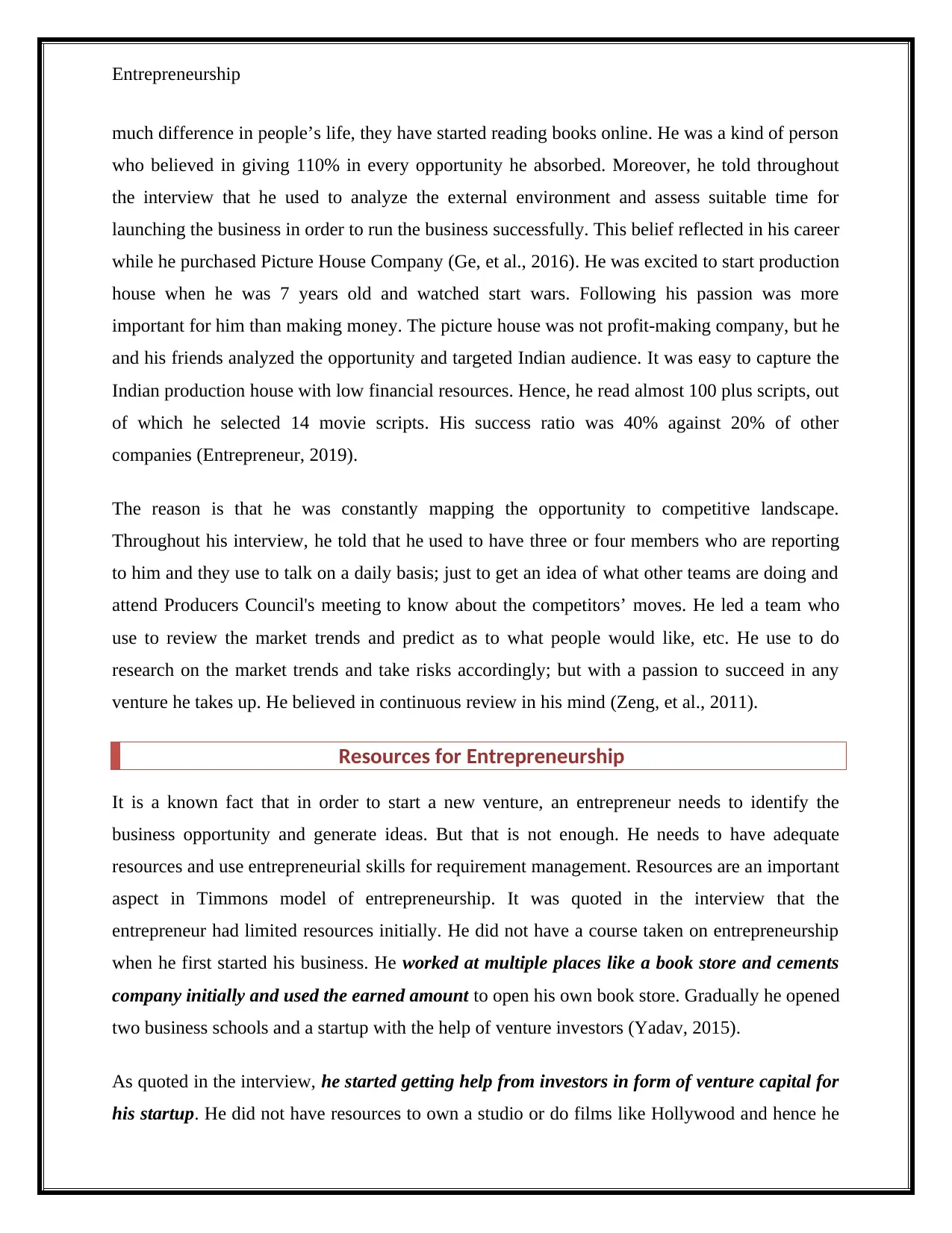
Entrepreneurship
much difference in people’s life, they have started reading books online. He was a kind of person
who believed in giving 110% in every opportunity he absorbed. Moreover, he told throughout
the interview that he used to analyze the external environment and assess suitable time for
launching the business in order to run the business successfully. This belief reflected in his career
while he purchased Picture House Company (Ge, et al., 2016). He was excited to start production
house when he was 7 years old and watched start wars. Following his passion was more
important for him than making money. The picture house was not profit-making company, but he
and his friends analyzed the opportunity and targeted Indian audience. It was easy to capture the
Indian production house with low financial resources. Hence, he read almost 100 plus scripts, out
of which he selected 14 movie scripts. His success ratio was 40% against 20% of other
companies (Entrepreneur, 2019).
The reason is that he was constantly mapping the opportunity to competitive landscape.
Throughout his interview, he told that he used to have three or four members who are reporting
to him and they use to talk on a daily basis; just to get an idea of what other teams are doing and
attend Producers Council's meeting to know about the competitors’ moves. He led a team who
use to review the market trends and predict as to what people would like, etc. He use to do
research on the market trends and take risks accordingly; but with a passion to succeed in any
venture he takes up. He believed in continuous review in his mind (Zeng, et al., 2011).
Resources for Entrepreneurship
It is a known fact that in order to start a new venture, an entrepreneur needs to identify the
business opportunity and generate ideas. But that is not enough. He needs to have adequate
resources and use entrepreneurial skills for requirement management. Resources are an important
aspect in Timmons model of entrepreneurship. It was quoted in the interview that the
entrepreneur had limited resources initially. He did not have a course taken on entrepreneurship
when he first started his business. He worked at multiple places like a book store and cements
company initially and used the earned amount to open his own book store. Gradually he opened
two business schools and a startup with the help of venture investors (Yadav, 2015).
As quoted in the interview, he started getting help from investors in form of venture capital for
his startup. He did not have resources to own a studio or do films like Hollywood and hence he
much difference in people’s life, they have started reading books online. He was a kind of person
who believed in giving 110% in every opportunity he absorbed. Moreover, he told throughout
the interview that he used to analyze the external environment and assess suitable time for
launching the business in order to run the business successfully. This belief reflected in his career
while he purchased Picture House Company (Ge, et al., 2016). He was excited to start production
house when he was 7 years old and watched start wars. Following his passion was more
important for him than making money. The picture house was not profit-making company, but he
and his friends analyzed the opportunity and targeted Indian audience. It was easy to capture the
Indian production house with low financial resources. Hence, he read almost 100 plus scripts, out
of which he selected 14 movie scripts. His success ratio was 40% against 20% of other
companies (Entrepreneur, 2019).
The reason is that he was constantly mapping the opportunity to competitive landscape.
Throughout his interview, he told that he used to have three or four members who are reporting
to him and they use to talk on a daily basis; just to get an idea of what other teams are doing and
attend Producers Council's meeting to know about the competitors’ moves. He led a team who
use to review the market trends and predict as to what people would like, etc. He use to do
research on the market trends and take risks accordingly; but with a passion to succeed in any
venture he takes up. He believed in continuous review in his mind (Zeng, et al., 2011).
Resources for Entrepreneurship
It is a known fact that in order to start a new venture, an entrepreneur needs to identify the
business opportunity and generate ideas. But that is not enough. He needs to have adequate
resources and use entrepreneurial skills for requirement management. Resources are an important
aspect in Timmons model of entrepreneurship. It was quoted in the interview that the
entrepreneur had limited resources initially. He did not have a course taken on entrepreneurship
when he first started his business. He worked at multiple places like a book store and cements
company initially and used the earned amount to open his own book store. Gradually he opened
two business schools and a startup with the help of venture investors (Yadav, 2015).
As quoted in the interview, he started getting help from investors in form of venture capital for
his startup. He did not have resources to own a studio or do films like Hollywood and hence he
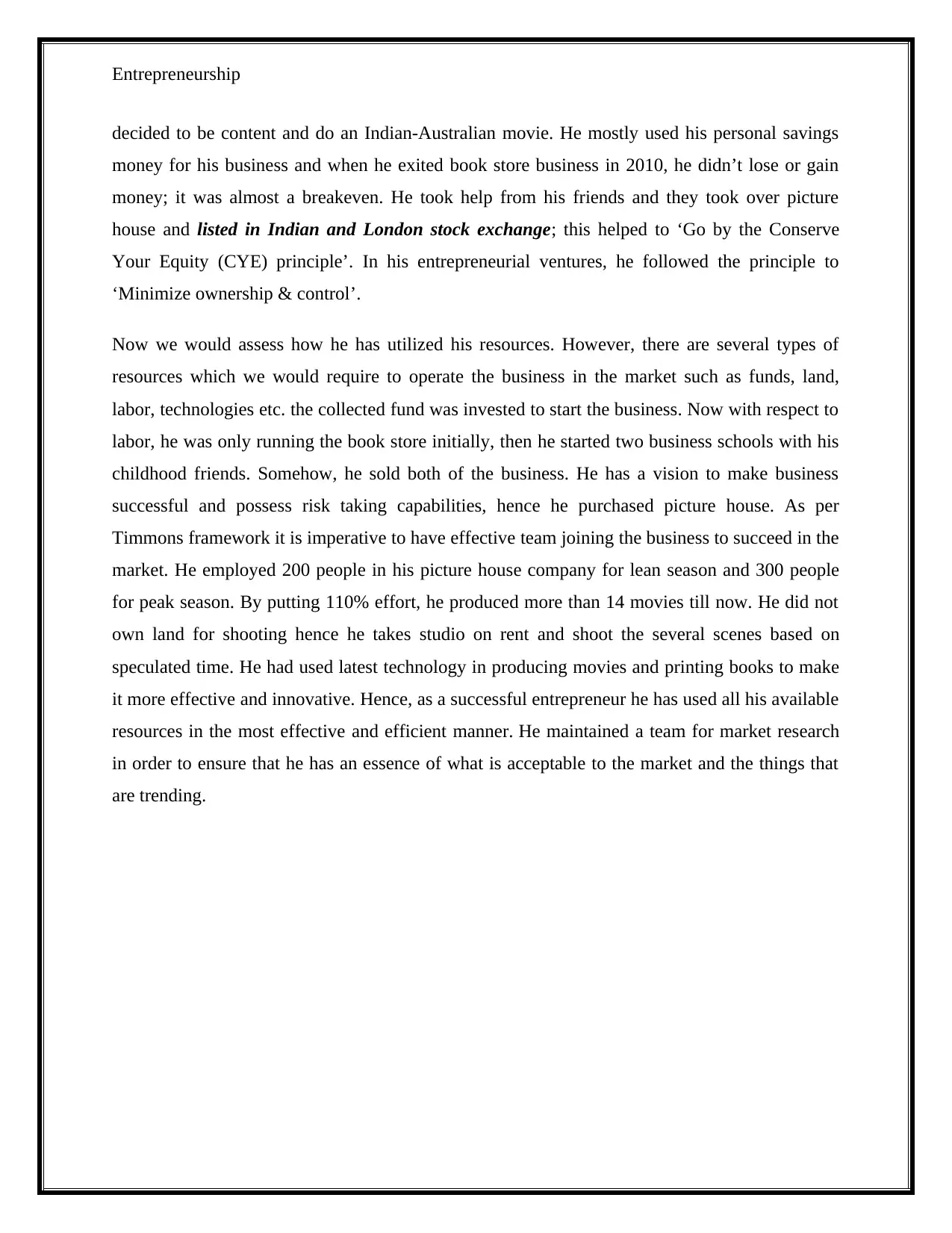
Entrepreneurship
decided to be content and do an Indian-Australian movie. He mostly used his personal savings
money for his business and when he exited book store business in 2010, he didn’t lose or gain
money; it was almost a breakeven. He took help from his friends and they took over picture
house and listed in Indian and London stock exchange; this helped to ‘Go by the Conserve
Your Equity (CYE) principle’. In his entrepreneurial ventures, he followed the principle to
‘Minimize ownership & control’.
Now we would assess how he has utilized his resources. However, there are several types of
resources which we would require to operate the business in the market such as funds, land,
labor, technologies etc. the collected fund was invested to start the business. Now with respect to
labor, he was only running the book store initially, then he started two business schools with his
childhood friends. Somehow, he sold both of the business. He has a vision to make business
successful and possess risk taking capabilities, hence he purchased picture house. As per
Timmons framework it is imperative to have effective team joining the business to succeed in the
market. He employed 200 people in his picture house company for lean season and 300 people
for peak season. By putting 110% effort, he produced more than 14 movies till now. He did not
own land for shooting hence he takes studio on rent and shoot the several scenes based on
speculated time. He had used latest technology in producing movies and printing books to make
it more effective and innovative. Hence, as a successful entrepreneur he has used all his available
resources in the most effective and efficient manner. He maintained a team for market research
in order to ensure that he has an essence of what is acceptable to the market and the things that
are trending.
decided to be content and do an Indian-Australian movie. He mostly used his personal savings
money for his business and when he exited book store business in 2010, he didn’t lose or gain
money; it was almost a breakeven. He took help from his friends and they took over picture
house and listed in Indian and London stock exchange; this helped to ‘Go by the Conserve
Your Equity (CYE) principle’. In his entrepreneurial ventures, he followed the principle to
‘Minimize ownership & control’.
Now we would assess how he has utilized his resources. However, there are several types of
resources which we would require to operate the business in the market such as funds, land,
labor, technologies etc. the collected fund was invested to start the business. Now with respect to
labor, he was only running the book store initially, then he started two business schools with his
childhood friends. Somehow, he sold both of the business. He has a vision to make business
successful and possess risk taking capabilities, hence he purchased picture house. As per
Timmons framework it is imperative to have effective team joining the business to succeed in the
market. He employed 200 people in his picture house company for lean season and 300 people
for peak season. By putting 110% effort, he produced more than 14 movies till now. He did not
own land for shooting hence he takes studio on rent and shoot the several scenes based on
speculated time. He had used latest technology in producing movies and printing books to make
it more effective and innovative. Hence, as a successful entrepreneur he has used all his available
resources in the most effective and efficient manner. He maintained a team for market research
in order to ensure that he has an essence of what is acceptable to the market and the things that
are trending.
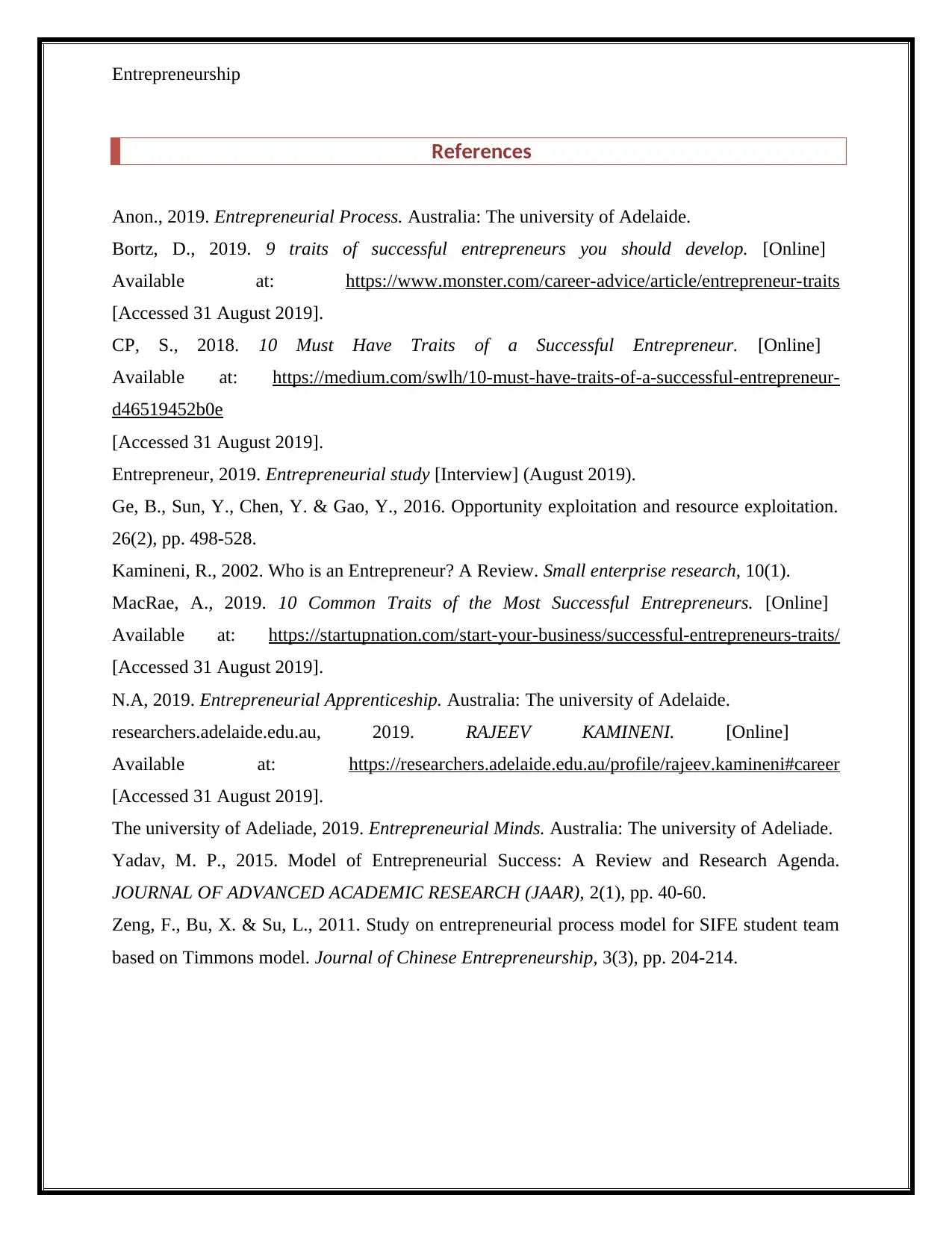
Entrepreneurship
References
Anon., 2019. Entrepreneurial Process. Australia: The university of Adelaide.
Bortz, D., 2019. 9 traits of successful entrepreneurs you should develop. [Online]
Available at: https://www.monster.com/career-advice/article/entrepreneur-traits
[Accessed 31 August 2019].
CP, S., 2018. 10 Must Have Traits of a Successful Entrepreneur. [Online]
Available at: https://medium.com/swlh/10-must-have-traits-of-a-successful-entrepreneur-
d46519452b0e
[Accessed 31 August 2019].
Entrepreneur, 2019. Entrepreneurial study [Interview] (August 2019).
Ge, B., Sun, Y., Chen, Y. & Gao, Y., 2016. Opportunity exploitation and resource exploitation.
26(2), pp. 498-528.
Kamineni, R., 2002. Who is an Entrepreneur? A Review. Small enterprise research, 10(1).
MacRae, A., 2019. 10 Common Traits of the Most Successful Entrepreneurs. [Online]
Available at: https://startupnation.com/start-your-business/successful-entrepreneurs-traits/
[Accessed 31 August 2019].
N.A, 2019. Entrepreneurial Apprenticeship. Australia: The university of Adelaide.
researchers.adelaide.edu.au, 2019. RAJEEV KAMINENI. [Online]
Available at: https://researchers.adelaide.edu.au/profile/rajeev.kamineni#career
[Accessed 31 August 2019].
The university of Adeliade, 2019. Entrepreneurial Minds. Australia: The university of Adeliade.
Yadav, M. P., 2015. Model of Entrepreneurial Success: A Review and Research Agenda.
JOURNAL OF ADVANCED ACADEMIC RESEARCH (JAAR), 2(1), pp. 40-60.
Zeng, F., Bu, X. & Su, L., 2011. Study on entrepreneurial process model for SIFE student team
based on Timmons model. Journal of Chinese Entrepreneurship, 3(3), pp. 204-214.
References
Anon., 2019. Entrepreneurial Process. Australia: The university of Adelaide.
Bortz, D., 2019. 9 traits of successful entrepreneurs you should develop. [Online]
Available at: https://www.monster.com/career-advice/article/entrepreneur-traits
[Accessed 31 August 2019].
CP, S., 2018. 10 Must Have Traits of a Successful Entrepreneur. [Online]
Available at: https://medium.com/swlh/10-must-have-traits-of-a-successful-entrepreneur-
d46519452b0e
[Accessed 31 August 2019].
Entrepreneur, 2019. Entrepreneurial study [Interview] (August 2019).
Ge, B., Sun, Y., Chen, Y. & Gao, Y., 2016. Opportunity exploitation and resource exploitation.
26(2), pp. 498-528.
Kamineni, R., 2002. Who is an Entrepreneur? A Review. Small enterprise research, 10(1).
MacRae, A., 2019. 10 Common Traits of the Most Successful Entrepreneurs. [Online]
Available at: https://startupnation.com/start-your-business/successful-entrepreneurs-traits/
[Accessed 31 August 2019].
N.A, 2019. Entrepreneurial Apprenticeship. Australia: The university of Adelaide.
researchers.adelaide.edu.au, 2019. RAJEEV KAMINENI. [Online]
Available at: https://researchers.adelaide.edu.au/profile/rajeev.kamineni#career
[Accessed 31 August 2019].
The university of Adeliade, 2019. Entrepreneurial Minds. Australia: The university of Adeliade.
Yadav, M. P., 2015. Model of Entrepreneurial Success: A Review and Research Agenda.
JOURNAL OF ADVANCED ACADEMIC RESEARCH (JAAR), 2(1), pp. 40-60.
Zeng, F., Bu, X. & Su, L., 2011. Study on entrepreneurial process model for SIFE student team
based on Timmons model. Journal of Chinese Entrepreneurship, 3(3), pp. 204-214.
Paraphrase This Document
Need a fresh take? Get an instant paraphrase of this document with our AI Paraphraser
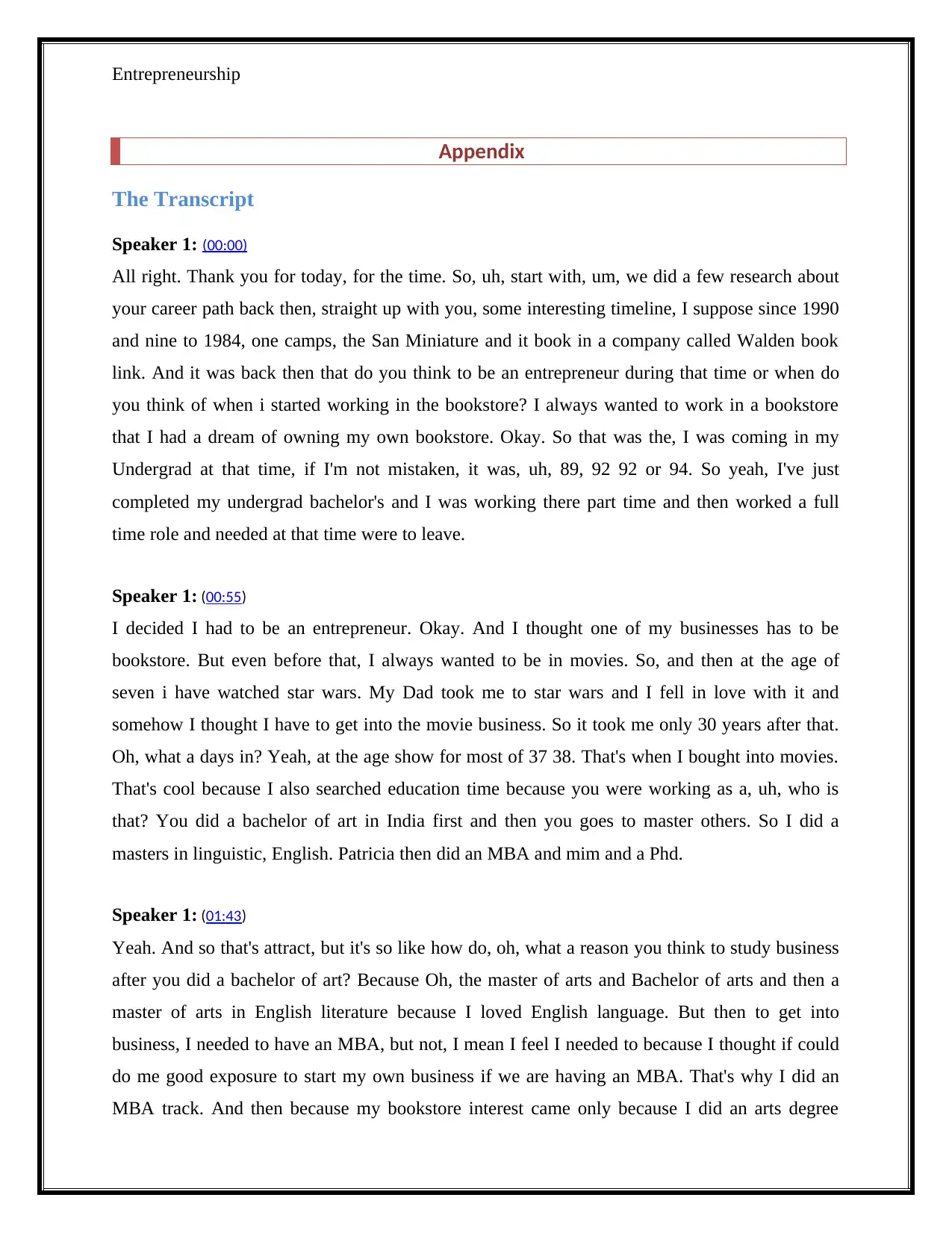
Entrepreneurship
Appendix
The Transcript
Speaker 1: (00:00)
All right. Thank you for today, for the time. So, uh, start with, um, we did a few research about
your career path back then, straight up with you, some interesting timeline, I suppose since 1990
and nine to 1984, one camps, the San Miniature and it book in a company called Walden book
link. And it was back then that do you think to be an entrepreneur during that time or when do
you think of when i started working in the bookstore? I always wanted to work in a bookstore
that I had a dream of owning my own bookstore. Okay. So that was the, I was coming in my
Undergrad at that time, if I'm not mistaken, it was, uh, 89, 92 92 or 94. So yeah, I've just
completed my undergrad bachelor's and I was working there part time and then worked a full
time role and needed at that time were to leave.
Speaker 1: (00:55)
I decided I had to be an entrepreneur. Okay. And I thought one of my businesses has to be
bookstore. But even before that, I always wanted to be in movies. So, and then at the age of
seven i have watched star wars. My Dad took me to star wars and I fell in love with it and
somehow I thought I have to get into the movie business. So it took me only 30 years after that.
Oh, what a days in? Yeah, at the age show for most of 37 38. That's when I bought into movies.
That's cool because I also searched education time because you were working as a, uh, who is
that? You did a bachelor of art in India first and then you goes to master others. So I did a
masters in linguistic, English. Patricia then did an MBA and mim and a Phd.
Speaker 1: (01:43)
Yeah. And so that's attract, but it's so like how do, oh, what a reason you think to study business
after you did a bachelor of art? Because Oh, the master of arts and Bachelor of arts and then a
master of arts in English literature because I loved English language. But then to get into
business, I needed to have an MBA, but not, I mean I feel I needed to because I thought if could
do me good exposure to start my own business if we are having an MBA. That's why I did an
MBA track. And then because my bookstore interest came only because I did an arts degree
Appendix
The Transcript
Speaker 1: (00:00)
All right. Thank you for today, for the time. So, uh, start with, um, we did a few research about
your career path back then, straight up with you, some interesting timeline, I suppose since 1990
and nine to 1984, one camps, the San Miniature and it book in a company called Walden book
link. And it was back then that do you think to be an entrepreneur during that time or when do
you think of when i started working in the bookstore? I always wanted to work in a bookstore
that I had a dream of owning my own bookstore. Okay. So that was the, I was coming in my
Undergrad at that time, if I'm not mistaken, it was, uh, 89, 92 92 or 94. So yeah, I've just
completed my undergrad bachelor's and I was working there part time and then worked a full
time role and needed at that time were to leave.
Speaker 1: (00:55)
I decided I had to be an entrepreneur. Okay. And I thought one of my businesses has to be
bookstore. But even before that, I always wanted to be in movies. So, and then at the age of
seven i have watched star wars. My Dad took me to star wars and I fell in love with it and
somehow I thought I have to get into the movie business. So it took me only 30 years after that.
Oh, what a days in? Yeah, at the age show for most of 37 38. That's when I bought into movies.
That's cool because I also searched education time because you were working as a, uh, who is
that? You did a bachelor of art in India first and then you goes to master others. So I did a
masters in linguistic, English. Patricia then did an MBA and mim and a Phd.
Speaker 1: (01:43)
Yeah. And so that's attract, but it's so like how do, oh, what a reason you think to study business
after you did a bachelor of art? Because Oh, the master of arts and Bachelor of arts and then a
master of arts in English literature because I loved English language. But then to get into
business, I needed to have an MBA, but not, I mean I feel I needed to because I thought if could
do me good exposure to start my own business if we are having an MBA. That's why I did an
MBA track. And then because my bookstore interest came only because I did an arts degree
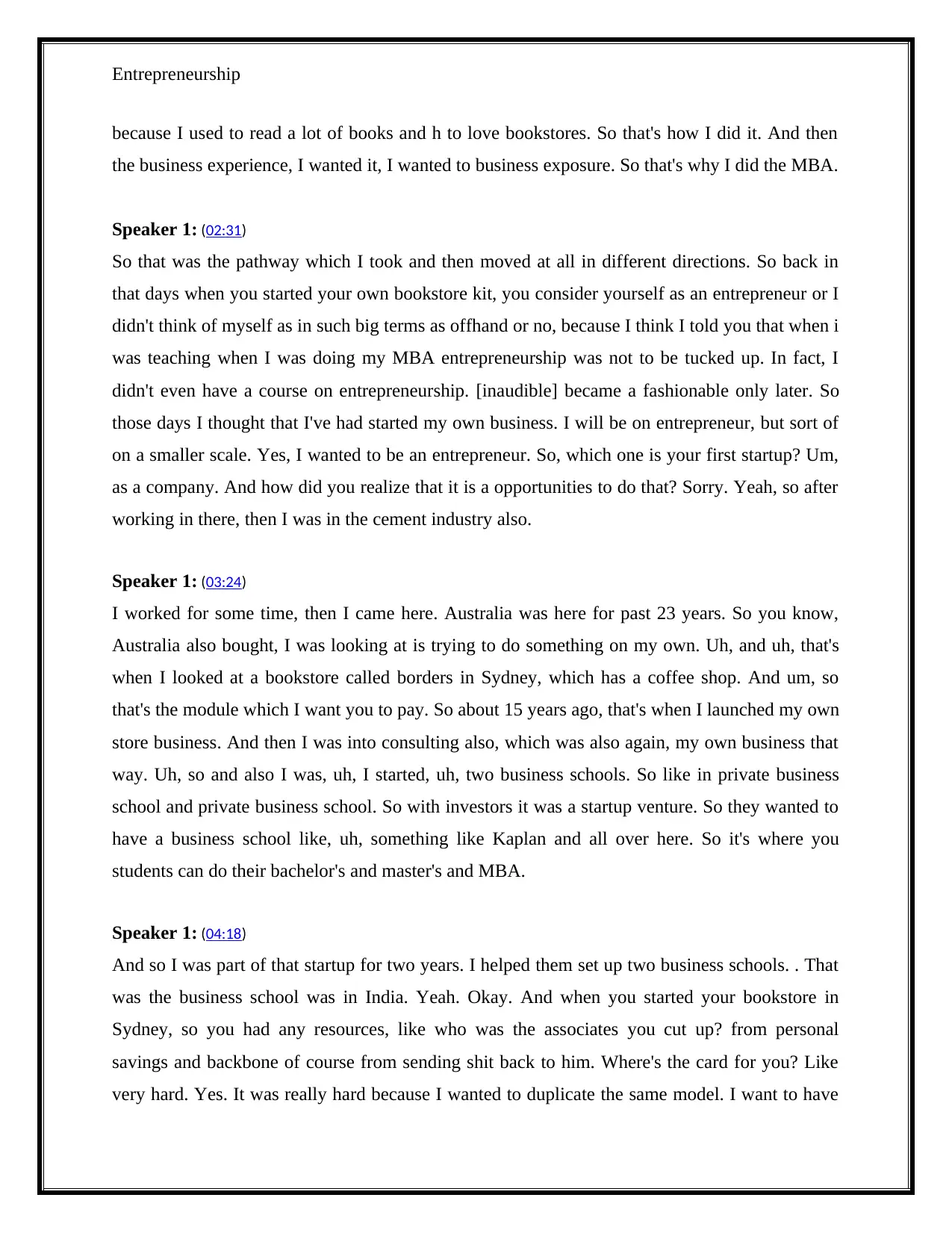
Entrepreneurship
because I used to read a lot of books and h to love bookstores. So that's how I did it. And then
the business experience, I wanted it, I wanted to business exposure. So that's why I did the MBA.
Speaker 1: (02:31)
So that was the pathway which I took and then moved at all in different directions. So back in
that days when you started your own bookstore kit, you consider yourself as an entrepreneur or I
didn't think of myself as in such big terms as offhand or no, because I think I told you that when i
was teaching when I was doing my MBA entrepreneurship was not to be tucked up. In fact, I
didn't even have a course on entrepreneurship. [inaudible] became a fashionable only later. So
those days I thought that I've had started my own business. I will be on entrepreneur, but sort of
on a smaller scale. Yes, I wanted to be an entrepreneur. So, which one is your first startup? Um,
as a company. And how did you realize that it is a opportunities to do that? Sorry. Yeah, so after
working in there, then I was in the cement industry also.
Speaker 1: (03:24)
I worked for some time, then I came here. Australia was here for past 23 years. So you know,
Australia also bought, I was looking at is trying to do something on my own. Uh, and uh, that's
when I looked at a bookstore called borders in Sydney, which has a coffee shop. And um, so
that's the module which I want you to pay. So about 15 years ago, that's when I launched my own
store business. And then I was into consulting also, which was also again, my own business that
way. Uh, so and also I was, uh, I started, uh, two business schools. So like in private business
school and private business school. So with investors it was a startup venture. So they wanted to
have a business school like, uh, something like Kaplan and all over here. So it's where you
students can do their bachelor's and master's and MBA.
Speaker 1: (04:18)
And so I was part of that startup for two years. I helped them set up two business schools. . That
was the business school was in India. Yeah. Okay. And when you started your bookstore in
Sydney, so you had any resources, like who was the associates you cut up? from personal
savings and backbone of course from sending shit back to him. Where's the card for you? Like
very hard. Yes. It was really hard because I wanted to duplicate the same model. I want to have
because I used to read a lot of books and h to love bookstores. So that's how I did it. And then
the business experience, I wanted it, I wanted to business exposure. So that's why I did the MBA.
Speaker 1: (02:31)
So that was the pathway which I took and then moved at all in different directions. So back in
that days when you started your own bookstore kit, you consider yourself as an entrepreneur or I
didn't think of myself as in such big terms as offhand or no, because I think I told you that when i
was teaching when I was doing my MBA entrepreneurship was not to be tucked up. In fact, I
didn't even have a course on entrepreneurship. [inaudible] became a fashionable only later. So
those days I thought that I've had started my own business. I will be on entrepreneur, but sort of
on a smaller scale. Yes, I wanted to be an entrepreneur. So, which one is your first startup? Um,
as a company. And how did you realize that it is a opportunities to do that? Sorry. Yeah, so after
working in there, then I was in the cement industry also.
Speaker 1: (03:24)
I worked for some time, then I came here. Australia was here for past 23 years. So you know,
Australia also bought, I was looking at is trying to do something on my own. Uh, and uh, that's
when I looked at a bookstore called borders in Sydney, which has a coffee shop. And um, so
that's the module which I want you to pay. So about 15 years ago, that's when I launched my own
store business. And then I was into consulting also, which was also again, my own business that
way. Uh, so and also I was, uh, I started, uh, two business schools. So like in private business
school and private business school. So with investors it was a startup venture. So they wanted to
have a business school like, uh, something like Kaplan and all over here. So it's where you
students can do their bachelor's and master's and MBA.
Speaker 1: (04:18)
And so I was part of that startup for two years. I helped them set up two business schools. . That
was the business school was in India. Yeah. Okay. And when you started your bookstore in
Sydney, so you had any resources, like who was the associates you cut up? from personal
savings and backbone of course from sending shit back to him. Where's the card for you? Like
very hard. Yes. It was really hard because I wanted to duplicate the same model. I want to have
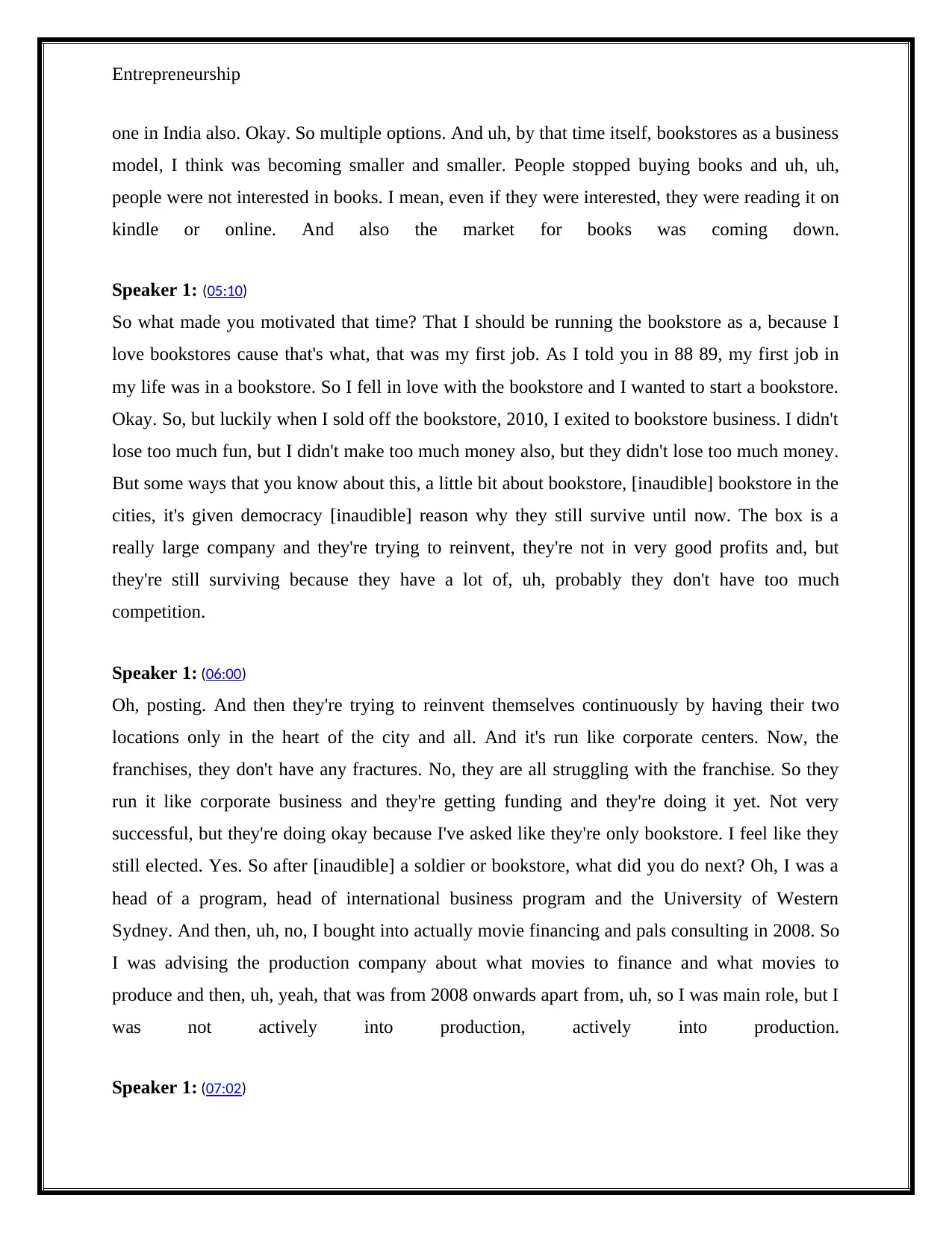
Entrepreneurship
one in India also. Okay. So multiple options. And uh, by that time itself, bookstores as a business
model, I think was becoming smaller and smaller. People stopped buying books and uh, uh,
people were not interested in books. I mean, even if they were interested, they were reading it on
kindle or online. And also the market for books was coming down.
Speaker 1: (05:10)
So what made you motivated that time? That I should be running the bookstore as a, because I
love bookstores cause that's what, that was my first job. As I told you in 88 89, my first job in
my life was in a bookstore. So I fell in love with the bookstore and I wanted to start a bookstore.
Okay. So, but luckily when I sold off the bookstore, 2010, I exited to bookstore business. I didn't
lose too much fun, but I didn't make too much money also, but they didn't lose too much money.
But some ways that you know about this, a little bit about bookstore, [inaudible] bookstore in the
cities, it's given democracy [inaudible] reason why they still survive until now. The box is a
really large company and they're trying to reinvent, they're not in very good profits and, but
they're still surviving because they have a lot of, uh, probably they don't have too much
competition.
Speaker 1: (06:00)
Oh, posting. And then they're trying to reinvent themselves continuously by having their two
locations only in the heart of the city and all. And it's run like corporate centers. Now, the
franchises, they don't have any fractures. No, they are all struggling with the franchise. So they
run it like corporate business and they're getting funding and they're doing it yet. Not very
successful, but they're doing okay because I've asked like they're only bookstore. I feel like they
still elected. Yes. So after [inaudible] a soldier or bookstore, what did you do next? Oh, I was a
head of a program, head of international business program and the University of Western
Sydney. And then, uh, no, I bought into actually movie financing and pals consulting in 2008. So
I was advising the production company about what movies to finance and what movies to
produce and then, uh, yeah, that was from 2008 onwards apart from, uh, so I was main role, but I
was not actively into production, actively into production.
Speaker 1: (07:02)
one in India also. Okay. So multiple options. And uh, by that time itself, bookstores as a business
model, I think was becoming smaller and smaller. People stopped buying books and uh, uh,
people were not interested in books. I mean, even if they were interested, they were reading it on
kindle or online. And also the market for books was coming down.
Speaker 1: (05:10)
So what made you motivated that time? That I should be running the bookstore as a, because I
love bookstores cause that's what, that was my first job. As I told you in 88 89, my first job in
my life was in a bookstore. So I fell in love with the bookstore and I wanted to start a bookstore.
Okay. So, but luckily when I sold off the bookstore, 2010, I exited to bookstore business. I didn't
lose too much fun, but I didn't make too much money also, but they didn't lose too much money.
But some ways that you know about this, a little bit about bookstore, [inaudible] bookstore in the
cities, it's given democracy [inaudible] reason why they still survive until now. The box is a
really large company and they're trying to reinvent, they're not in very good profits and, but
they're still surviving because they have a lot of, uh, probably they don't have too much
competition.
Speaker 1: (06:00)
Oh, posting. And then they're trying to reinvent themselves continuously by having their two
locations only in the heart of the city and all. And it's run like corporate centers. Now, the
franchises, they don't have any fractures. No, they are all struggling with the franchise. So they
run it like corporate business and they're getting funding and they're doing it yet. Not very
successful, but they're doing okay because I've asked like they're only bookstore. I feel like they
still elected. Yes. So after [inaudible] a soldier or bookstore, what did you do next? Oh, I was a
head of a program, head of international business program and the University of Western
Sydney. And then, uh, no, I bought into actually movie financing and pals consulting in 2008. So
I was advising the production company about what movies to finance and what movies to
produce and then, uh, yeah, that was from 2008 onwards apart from, uh, so I was main role, but I
was not actively into production, actively into production.
Speaker 1: (07:02)
Secure Best Marks with AI Grader
Need help grading? Try our AI Grader for instant feedback on your assignments.
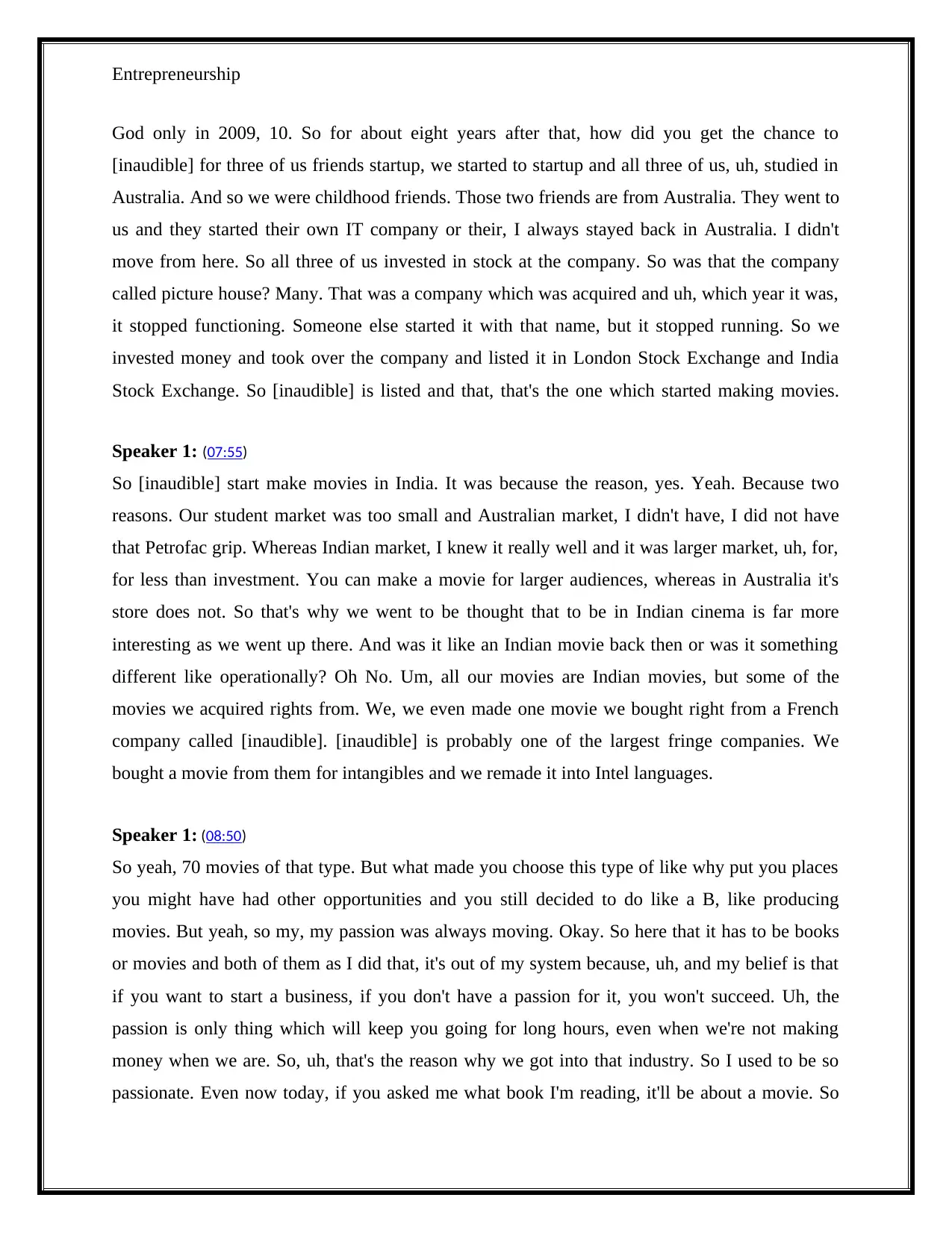
Entrepreneurship
God only in 2009, 10. So for about eight years after that, how did you get the chance to
[inaudible] for three of us friends startup, we started to startup and all three of us, uh, studied in
Australia. And so we were childhood friends. Those two friends are from Australia. They went to
us and they started their own IT company or their, I always stayed back in Australia. I didn't
move from here. So all three of us invested in stock at the company. So was that the company
called picture house? Many. That was a company which was acquired and uh, which year it was,
it stopped functioning. Someone else started it with that name, but it stopped running. So we
invested money and took over the company and listed it in London Stock Exchange and India
Stock Exchange. So [inaudible] is listed and that, that's the one which started making movies.
Speaker 1: (07:55)
So [inaudible] start make movies in India. It was because the reason, yes. Yeah. Because two
reasons. Our student market was too small and Australian market, I didn't have, I did not have
that Petrofac grip. Whereas Indian market, I knew it really well and it was larger market, uh, for,
for less than investment. You can make a movie for larger audiences, whereas in Australia it's
store does not. So that's why we went to be thought that to be in Indian cinema is far more
interesting as we went up there. And was it like an Indian movie back then or was it something
different like operationally? Oh No. Um, all our movies are Indian movies, but some of the
movies we acquired rights from. We, we even made one movie we bought right from a French
company called [inaudible]. [inaudible] is probably one of the largest fringe companies. We
bought a movie from them for intangibles and we remade it into Intel languages.
Speaker 1: (08:50)
So yeah, 70 movies of that type. But what made you choose this type of like why put you places
you might have had other opportunities and you still decided to do like a B, like producing
movies. But yeah, so my, my passion was always moving. Okay. So here that it has to be books
or movies and both of them as I did that, it's out of my system because, uh, and my belief is that
if you want to start a business, if you don't have a passion for it, you won't succeed. Uh, the
passion is only thing which will keep you going for long hours, even when we're not making
money when we are. So, uh, that's the reason why we got into that industry. So I used to be so
passionate. Even now today, if you asked me what book I'm reading, it'll be about a movie. So
God only in 2009, 10. So for about eight years after that, how did you get the chance to
[inaudible] for three of us friends startup, we started to startup and all three of us, uh, studied in
Australia. And so we were childhood friends. Those two friends are from Australia. They went to
us and they started their own IT company or their, I always stayed back in Australia. I didn't
move from here. So all three of us invested in stock at the company. So was that the company
called picture house? Many. That was a company which was acquired and uh, which year it was,
it stopped functioning. Someone else started it with that name, but it stopped running. So we
invested money and took over the company and listed it in London Stock Exchange and India
Stock Exchange. So [inaudible] is listed and that, that's the one which started making movies.
Speaker 1: (07:55)
So [inaudible] start make movies in India. It was because the reason, yes. Yeah. Because two
reasons. Our student market was too small and Australian market, I didn't have, I did not have
that Petrofac grip. Whereas Indian market, I knew it really well and it was larger market, uh, for,
for less than investment. You can make a movie for larger audiences, whereas in Australia it's
store does not. So that's why we went to be thought that to be in Indian cinema is far more
interesting as we went up there. And was it like an Indian movie back then or was it something
different like operationally? Oh No. Um, all our movies are Indian movies, but some of the
movies we acquired rights from. We, we even made one movie we bought right from a French
company called [inaudible]. [inaudible] is probably one of the largest fringe companies. We
bought a movie from them for intangibles and we remade it into Intel languages.
Speaker 1: (08:50)
So yeah, 70 movies of that type. But what made you choose this type of like why put you places
you might have had other opportunities and you still decided to do like a B, like producing
movies. But yeah, so my, my passion was always moving. Okay. So here that it has to be books
or movies and both of them as I did that, it's out of my system because, uh, and my belief is that
if you want to start a business, if you don't have a passion for it, you won't succeed. Uh, the
passion is only thing which will keep you going for long hours, even when we're not making
money when we are. So, uh, that's the reason why we got into that industry. So I used to be so
passionate. Even now today, if you asked me what book I'm reading, it'll be about a movie. So
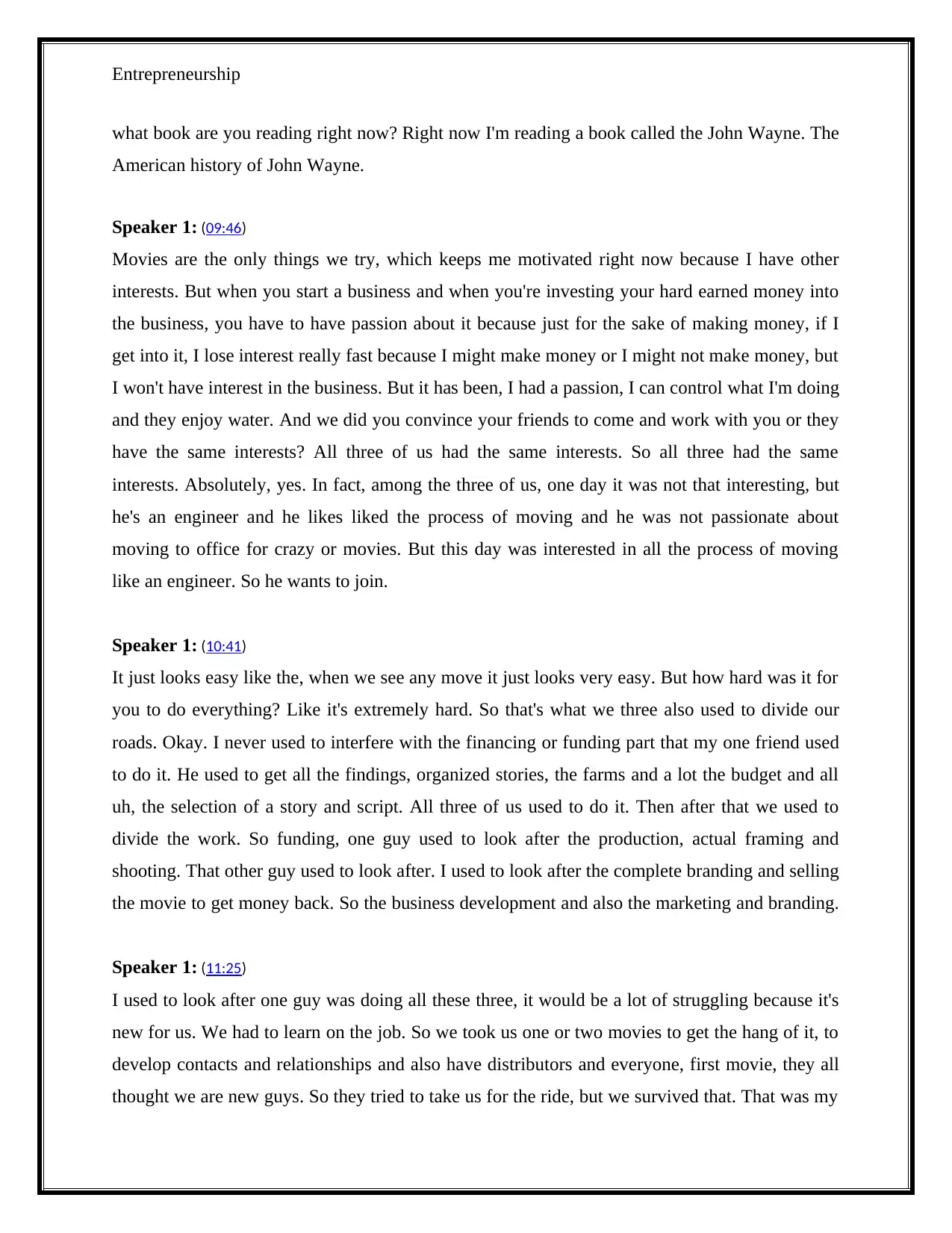
Entrepreneurship
what book are you reading right now? Right now I'm reading a book called the John Wayne. The
American history of John Wayne.
Speaker 1: (09:46)
Movies are the only things we try, which keeps me motivated right now because I have other
interests. But when you start a business and when you're investing your hard earned money into
the business, you have to have passion about it because just for the sake of making money, if I
get into it, I lose interest really fast because I might make money or I might not make money, but
I won't have interest in the business. But it has been, I had a passion, I can control what I'm doing
and they enjoy water. And we did you convince your friends to come and work with you or they
have the same interests? All three of us had the same interests. So all three had the same
interests. Absolutely, yes. In fact, among the three of us, one day it was not that interesting, but
he's an engineer and he likes liked the process of moving and he was not passionate about
moving to office for crazy or movies. But this day was interested in all the process of moving
like an engineer. So he wants to join.
Speaker 1: (10:41)
It just looks easy like the, when we see any move it just looks very easy. But how hard was it for
you to do everything? Like it's extremely hard. So that's what we three also used to divide our
roads. Okay. I never used to interfere with the financing or funding part that my one friend used
to do it. He used to get all the findings, organized stories, the farms and a lot the budget and all
uh, the selection of a story and script. All three of us used to do it. Then after that we used to
divide the work. So funding, one guy used to look after the production, actual framing and
shooting. That other guy used to look after. I used to look after the complete branding and selling
the movie to get money back. So the business development and also the marketing and branding.
Speaker 1: (11:25)
I used to look after one guy was doing all these three, it would be a lot of struggling because it's
new for us. We had to learn on the job. So we took us one or two movies to get the hang of it, to
develop contacts and relationships and also have distributors and everyone, first movie, they all
thought we are new guys. So they tried to take us for the ride, but we survived that. That was my
what book are you reading right now? Right now I'm reading a book called the John Wayne. The
American history of John Wayne.
Speaker 1: (09:46)
Movies are the only things we try, which keeps me motivated right now because I have other
interests. But when you start a business and when you're investing your hard earned money into
the business, you have to have passion about it because just for the sake of making money, if I
get into it, I lose interest really fast because I might make money or I might not make money, but
I won't have interest in the business. But it has been, I had a passion, I can control what I'm doing
and they enjoy water. And we did you convince your friends to come and work with you or they
have the same interests? All three of us had the same interests. So all three had the same
interests. Absolutely, yes. In fact, among the three of us, one day it was not that interesting, but
he's an engineer and he likes liked the process of moving and he was not passionate about
moving to office for crazy or movies. But this day was interested in all the process of moving
like an engineer. So he wants to join.
Speaker 1: (10:41)
It just looks easy like the, when we see any move it just looks very easy. But how hard was it for
you to do everything? Like it's extremely hard. So that's what we three also used to divide our
roads. Okay. I never used to interfere with the financing or funding part that my one friend used
to do it. He used to get all the findings, organized stories, the farms and a lot the budget and all
uh, the selection of a story and script. All three of us used to do it. Then after that we used to
divide the work. So funding, one guy used to look after the production, actual framing and
shooting. That other guy used to look after. I used to look after the complete branding and selling
the movie to get money back. So the business development and also the marketing and branding.
Speaker 1: (11:25)
I used to look after one guy was doing all these three, it would be a lot of struggling because it's
new for us. We had to learn on the job. So we took us one or two movies to get the hang of it, to
develop contacts and relationships and also have distributors and everyone, first movie, they all
thought we are new guys. So they tried to take us for the ride, but we survived that. That was my
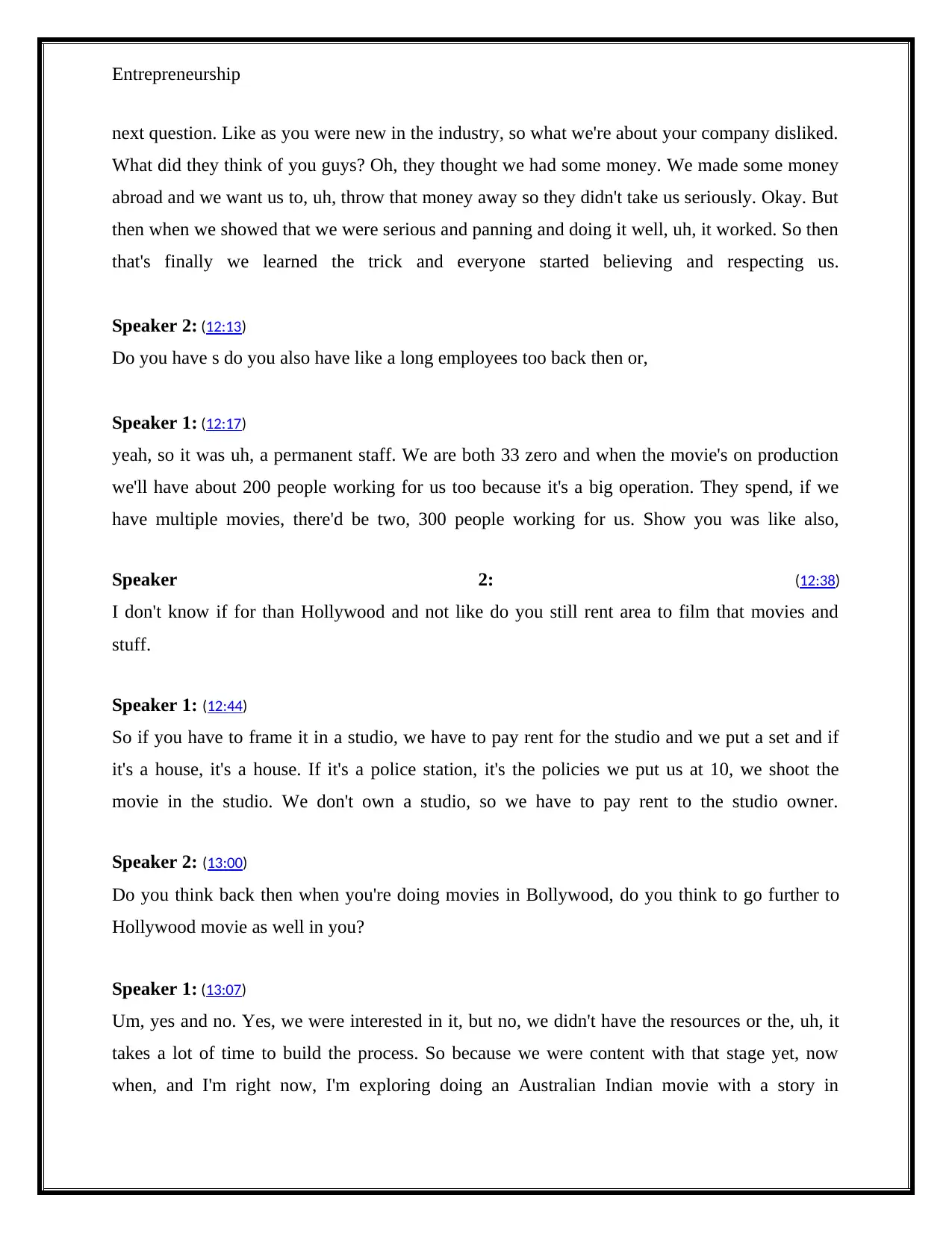
Entrepreneurship
next question. Like as you were new in the industry, so what we're about your company disliked.
What did they think of you guys? Oh, they thought we had some money. We made some money
abroad and we want us to, uh, throw that money away so they didn't take us seriously. Okay. But
then when we showed that we were serious and panning and doing it well, uh, it worked. So then
that's finally we learned the trick and everyone started believing and respecting us.
Speaker 2: (12:13)
Do you have s do you also have like a long employees too back then or,
Speaker 1: (12:17)
yeah, so it was uh, a permanent staff. We are both 33 zero and when the movie's on production
we'll have about 200 people working for us too because it's a big operation. They spend, if we
have multiple movies, there'd be two, 300 people working for us. Show you was like also,
Speaker 2: (12:38)
I don't know if for than Hollywood and not like do you still rent area to film that movies and
stuff.
Speaker 1: (12:44)
So if you have to frame it in a studio, we have to pay rent for the studio and we put a set and if
it's a house, it's a house. If it's a police station, it's the policies we put us at 10, we shoot the
movie in the studio. We don't own a studio, so we have to pay rent to the studio owner.
Speaker 2: (13:00)
Do you think back then when you're doing movies in Bollywood, do you think to go further to
Hollywood movie as well in you?
Speaker 1: (13:07)
Um, yes and no. Yes, we were interested in it, but no, we didn't have the resources or the, uh, it
takes a lot of time to build the process. So because we were content with that stage yet, now
when, and I'm right now, I'm exploring doing an Australian Indian movie with a story in
next question. Like as you were new in the industry, so what we're about your company disliked.
What did they think of you guys? Oh, they thought we had some money. We made some money
abroad and we want us to, uh, throw that money away so they didn't take us seriously. Okay. But
then when we showed that we were serious and panning and doing it well, uh, it worked. So then
that's finally we learned the trick and everyone started believing and respecting us.
Speaker 2: (12:13)
Do you have s do you also have like a long employees too back then or,
Speaker 1: (12:17)
yeah, so it was uh, a permanent staff. We are both 33 zero and when the movie's on production
we'll have about 200 people working for us too because it's a big operation. They spend, if we
have multiple movies, there'd be two, 300 people working for us. Show you was like also,
Speaker 2: (12:38)
I don't know if for than Hollywood and not like do you still rent area to film that movies and
stuff.
Speaker 1: (12:44)
So if you have to frame it in a studio, we have to pay rent for the studio and we put a set and if
it's a house, it's a house. If it's a police station, it's the policies we put us at 10, we shoot the
movie in the studio. We don't own a studio, so we have to pay rent to the studio owner.
Speaker 2: (13:00)
Do you think back then when you're doing movies in Bollywood, do you think to go further to
Hollywood movie as well in you?
Speaker 1: (13:07)
Um, yes and no. Yes, we were interested in it, but no, we didn't have the resources or the, uh, it
takes a lot of time to build the process. So because we were content with that stage yet, now
when, and I'm right now, I'm exploring doing an Australian Indian movie with a story in
Paraphrase This Document
Need a fresh take? Get an instant paraphrase of this document with our AI Paraphraser
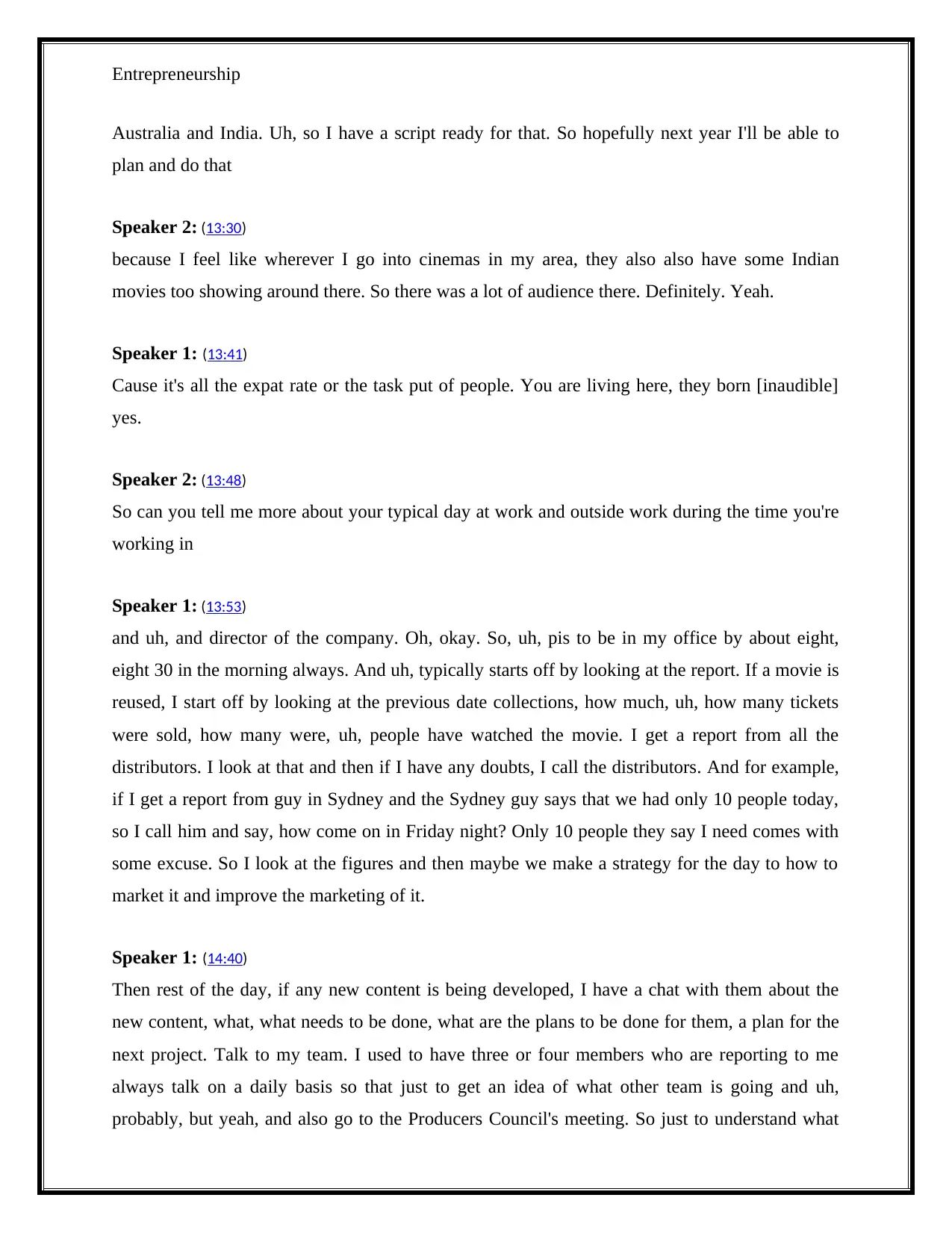
Entrepreneurship
Australia and India. Uh, so I have a script ready for that. So hopefully next year I'll be able to
plan and do that
Speaker 2: (13:30)
because I feel like wherever I go into cinemas in my area, they also also have some Indian
movies too showing around there. So there was a lot of audience there. Definitely. Yeah.
Speaker 1: (13:41)
Cause it's all the expat rate or the task put of people. You are living here, they born [inaudible]
yes.
Speaker 2: (13:48)
So can you tell me more about your typical day at work and outside work during the time you're
working in
Speaker 1: (13:53)
and uh, and director of the company. Oh, okay. So, uh, pis to be in my office by about eight,
eight 30 in the morning always. And uh, typically starts off by looking at the report. If a movie is
reused, I start off by looking at the previous date collections, how much, uh, how many tickets
were sold, how many were, uh, people have watched the movie. I get a report from all the
distributors. I look at that and then if I have any doubts, I call the distributors. And for example,
if I get a report from guy in Sydney and the Sydney guy says that we had only 10 people today,
so I call him and say, how come on in Friday night? Only 10 people they say I need comes with
some excuse. So I look at the figures and then maybe we make a strategy for the day to how to
market it and improve the marketing of it.
Speaker 1: (14:40)
Then rest of the day, if any new content is being developed, I have a chat with them about the
new content, what, what needs to be done, what are the plans to be done for them, a plan for the
next project. Talk to my team. I used to have three or four members who are reporting to me
always talk on a daily basis so that just to get an idea of what other team is going and uh,
probably, but yeah, and also go to the Producers Council's meeting. So just to understand what
Australia and India. Uh, so I have a script ready for that. So hopefully next year I'll be able to
plan and do that
Speaker 2: (13:30)
because I feel like wherever I go into cinemas in my area, they also also have some Indian
movies too showing around there. So there was a lot of audience there. Definitely. Yeah.
Speaker 1: (13:41)
Cause it's all the expat rate or the task put of people. You are living here, they born [inaudible]
yes.
Speaker 2: (13:48)
So can you tell me more about your typical day at work and outside work during the time you're
working in
Speaker 1: (13:53)
and uh, and director of the company. Oh, okay. So, uh, pis to be in my office by about eight,
eight 30 in the morning always. And uh, typically starts off by looking at the report. If a movie is
reused, I start off by looking at the previous date collections, how much, uh, how many tickets
were sold, how many were, uh, people have watched the movie. I get a report from all the
distributors. I look at that and then if I have any doubts, I call the distributors. And for example,
if I get a report from guy in Sydney and the Sydney guy says that we had only 10 people today,
so I call him and say, how come on in Friday night? Only 10 people they say I need comes with
some excuse. So I look at the figures and then maybe we make a strategy for the day to how to
market it and improve the marketing of it.
Speaker 1: (14:40)
Then rest of the day, if any new content is being developed, I have a chat with them about the
new content, what, what needs to be done, what are the plans to be done for them, a plan for the
next project. Talk to my team. I used to have three or four members who are reporting to me
always talk on a daily basis so that just to get an idea of what other team is going and uh,
probably, but yeah, and also go to the Producers Council's meeting. So just to understand what
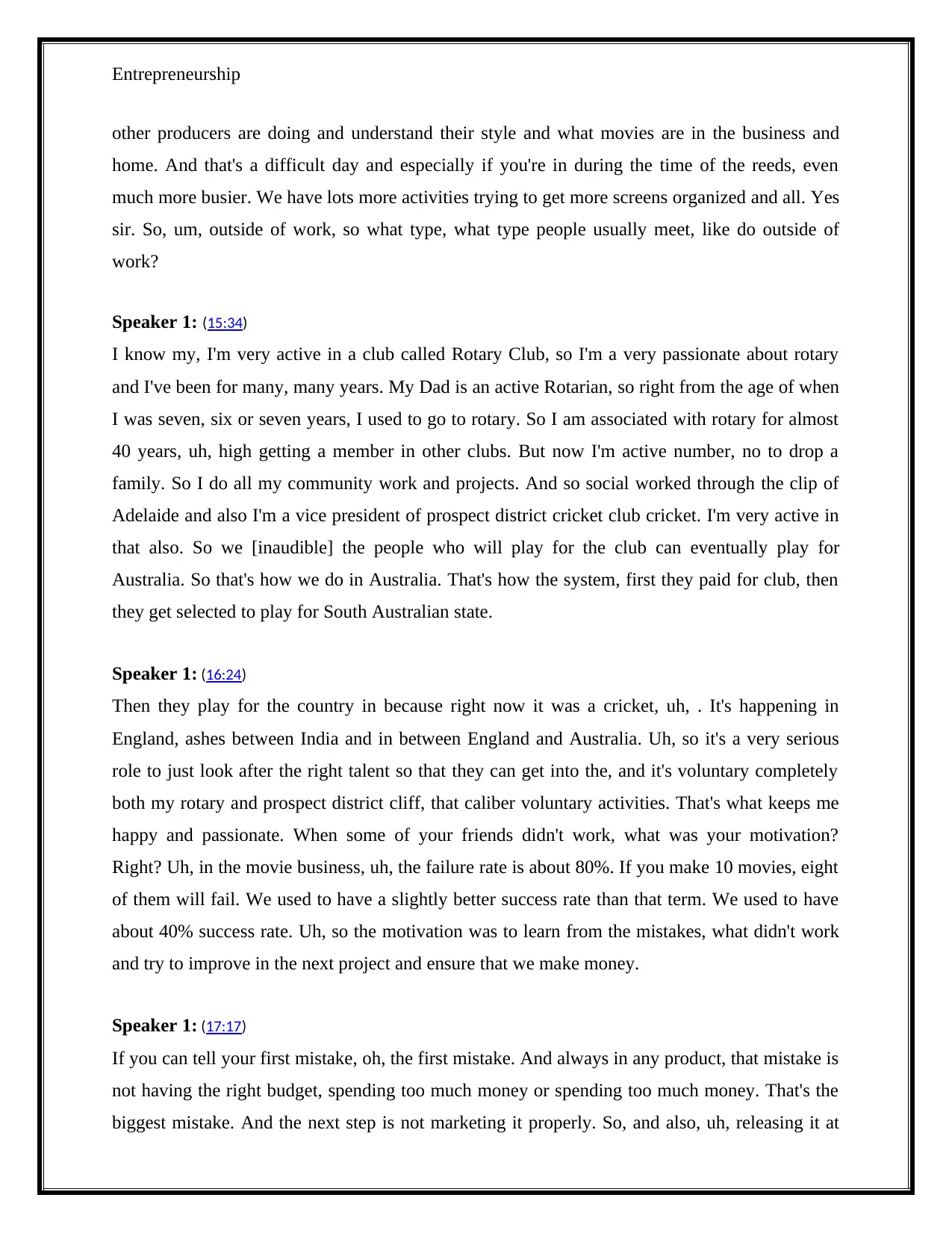
Entrepreneurship
other producers are doing and understand their style and what movies are in the business and
home. And that's a difficult day and especially if you're in during the time of the reeds, even
much more busier. We have lots more activities trying to get more screens organized and all. Yes
sir. So, um, outside of work, so what type, what type people usually meet, like do outside of
work?
Speaker 1: (15:34)
I know my, I'm very active in a club called Rotary Club, so I'm a very passionate about rotary
and I've been for many, many years. My Dad is an active Rotarian, so right from the age of when
I was seven, six or seven years, I used to go to rotary. So I am associated with rotary for almost
40 years, uh, high getting a member in other clubs. But now I'm active number, no to drop a
family. So I do all my community work and projects. And so social worked through the clip of
Adelaide and also I'm a vice president of prospect district cricket club cricket. I'm very active in
that also. So we [inaudible] the people who will play for the club can eventually play for
Australia. So that's how we do in Australia. That's how the system, first they paid for club, then
they get selected to play for South Australian state.
Speaker 1: (16:24)
Then they play for the country in because right now it was a cricket, uh, . It's happening in
England, ashes between India and in between England and Australia. Uh, so it's a very serious
role to just look after the right talent so that they can get into the, and it's voluntary completely
both my rotary and prospect district cliff, that caliber voluntary activities. That's what keeps me
happy and passionate. When some of your friends didn't work, what was your motivation?
Right? Uh, in the movie business, uh, the failure rate is about 80%. If you make 10 movies, eight
of them will fail. We used to have a slightly better success rate than that term. We used to have
about 40% success rate. Uh, so the motivation was to learn from the mistakes, what didn't work
and try to improve in the next project and ensure that we make money.
Speaker 1: (17:17)
If you can tell your first mistake, oh, the first mistake. And always in any product, that mistake is
not having the right budget, spending too much money or spending too much money. That's the
biggest mistake. And the next step is not marketing it properly. So, and also, uh, releasing it at
other producers are doing and understand their style and what movies are in the business and
home. And that's a difficult day and especially if you're in during the time of the reeds, even
much more busier. We have lots more activities trying to get more screens organized and all. Yes
sir. So, um, outside of work, so what type, what type people usually meet, like do outside of
work?
Speaker 1: (15:34)
I know my, I'm very active in a club called Rotary Club, so I'm a very passionate about rotary
and I've been for many, many years. My Dad is an active Rotarian, so right from the age of when
I was seven, six or seven years, I used to go to rotary. So I am associated with rotary for almost
40 years, uh, high getting a member in other clubs. But now I'm active number, no to drop a
family. So I do all my community work and projects. And so social worked through the clip of
Adelaide and also I'm a vice president of prospect district cricket club cricket. I'm very active in
that also. So we [inaudible] the people who will play for the club can eventually play for
Australia. So that's how we do in Australia. That's how the system, first they paid for club, then
they get selected to play for South Australian state.
Speaker 1: (16:24)
Then they play for the country in because right now it was a cricket, uh, . It's happening in
England, ashes between India and in between England and Australia. Uh, so it's a very serious
role to just look after the right talent so that they can get into the, and it's voluntary completely
both my rotary and prospect district cliff, that caliber voluntary activities. That's what keeps me
happy and passionate. When some of your friends didn't work, what was your motivation?
Right? Uh, in the movie business, uh, the failure rate is about 80%. If you make 10 movies, eight
of them will fail. We used to have a slightly better success rate than that term. We used to have
about 40% success rate. Uh, so the motivation was to learn from the mistakes, what didn't work
and try to improve in the next project and ensure that we make money.
Speaker 1: (17:17)
If you can tell your first mistake, oh, the first mistake. And always in any product, that mistake is
not having the right budget, spending too much money or spending too much money. That's the
biggest mistake. And the next step is not marketing it properly. So, and also, uh, releasing it at
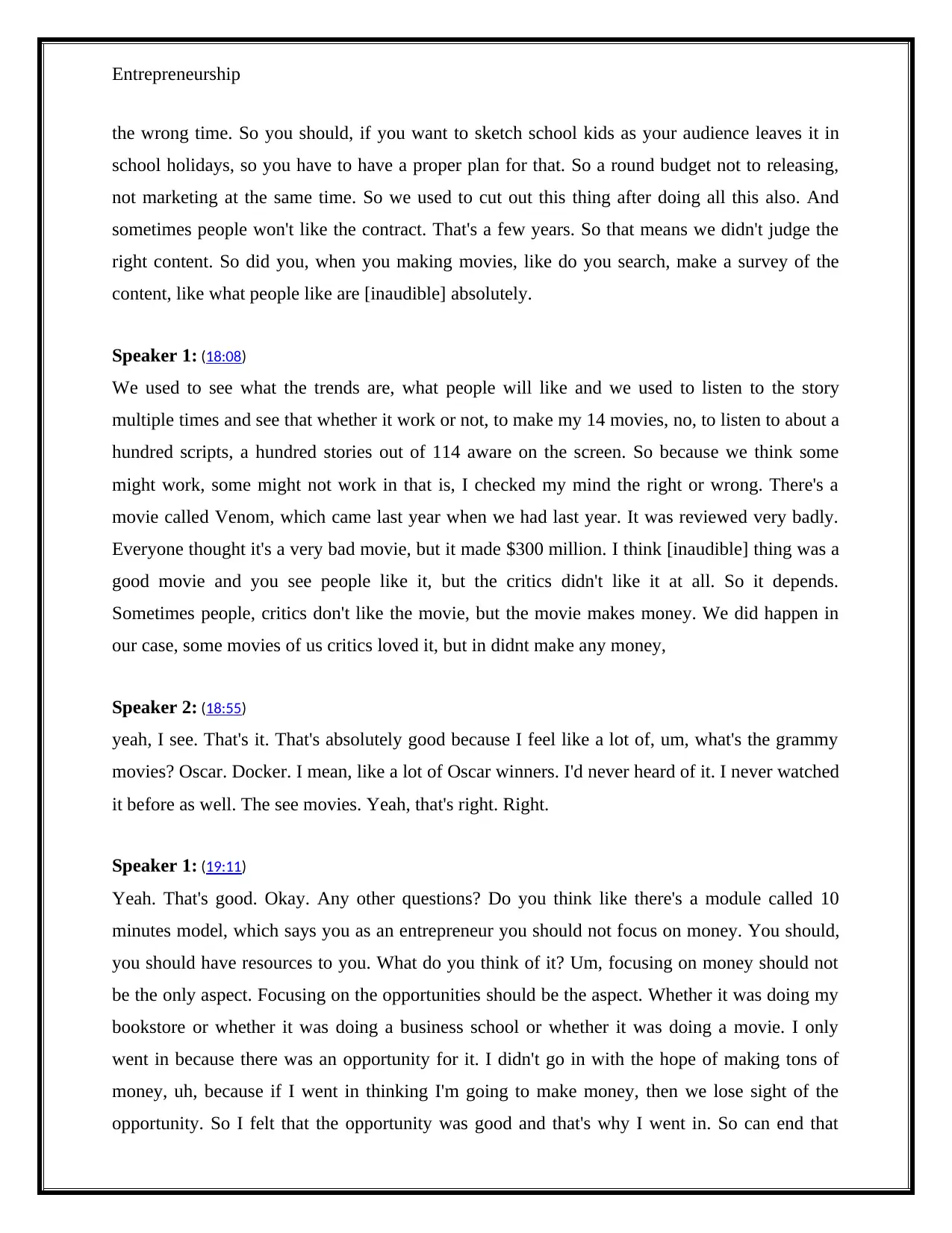
Entrepreneurship
the wrong time. So you should, if you want to sketch school kids as your audience leaves it in
school holidays, so you have to have a proper plan for that. So a round budget not to releasing,
not marketing at the same time. So we used to cut out this thing after doing all this also. And
sometimes people won't like the contract. That's a few years. So that means we didn't judge the
right content. So did you, when you making movies, like do you search, make a survey of the
content, like what people like are [inaudible] absolutely.
Speaker 1: (18:08)
We used to see what the trends are, what people will like and we used to listen to the story
multiple times and see that whether it work or not, to make my 14 movies, no, to listen to about a
hundred scripts, a hundred stories out of 114 aware on the screen. So because we think some
might work, some might not work in that is, I checked my mind the right or wrong. There's a
movie called Venom, which came last year when we had last year. It was reviewed very badly.
Everyone thought it's a very bad movie, but it made $300 million. I think [inaudible] thing was a
good movie and you see people like it, but the critics didn't like it at all. So it depends.
Sometimes people, critics don't like the movie, but the movie makes money. We did happen in
our case, some movies of us critics loved it, but in didnt make any money,
Speaker 2: (18:55)
yeah, I see. That's it. That's absolutely good because I feel like a lot of, um, what's the grammy
movies? Oscar. Docker. I mean, like a lot of Oscar winners. I'd never heard of it. I never watched
it before as well. The see movies. Yeah, that's right. Right.
Speaker 1: (19:11)
Yeah. That's good. Okay. Any other questions? Do you think like there's a module called 10
minutes model, which says you as an entrepreneur you should not focus on money. You should,
you should have resources to you. What do you think of it? Um, focusing on money should not
be the only aspect. Focusing on the opportunities should be the aspect. Whether it was doing my
bookstore or whether it was doing a business school or whether it was doing a movie. I only
went in because there was an opportunity for it. I didn't go in with the hope of making tons of
money, uh, because if I went in thinking I'm going to make money, then we lose sight of the
opportunity. So I felt that the opportunity was good and that's why I went in. So can end that
the wrong time. So you should, if you want to sketch school kids as your audience leaves it in
school holidays, so you have to have a proper plan for that. So a round budget not to releasing,
not marketing at the same time. So we used to cut out this thing after doing all this also. And
sometimes people won't like the contract. That's a few years. So that means we didn't judge the
right content. So did you, when you making movies, like do you search, make a survey of the
content, like what people like are [inaudible] absolutely.
Speaker 1: (18:08)
We used to see what the trends are, what people will like and we used to listen to the story
multiple times and see that whether it work or not, to make my 14 movies, no, to listen to about a
hundred scripts, a hundred stories out of 114 aware on the screen. So because we think some
might work, some might not work in that is, I checked my mind the right or wrong. There's a
movie called Venom, which came last year when we had last year. It was reviewed very badly.
Everyone thought it's a very bad movie, but it made $300 million. I think [inaudible] thing was a
good movie and you see people like it, but the critics didn't like it at all. So it depends.
Sometimes people, critics don't like the movie, but the movie makes money. We did happen in
our case, some movies of us critics loved it, but in didnt make any money,
Speaker 2: (18:55)
yeah, I see. That's it. That's absolutely good because I feel like a lot of, um, what's the grammy
movies? Oscar. Docker. I mean, like a lot of Oscar winners. I'd never heard of it. I never watched
it before as well. The see movies. Yeah, that's right. Right.
Speaker 1: (19:11)
Yeah. That's good. Okay. Any other questions? Do you think like there's a module called 10
minutes model, which says you as an entrepreneur you should not focus on money. You should,
you should have resources to you. What do you think of it? Um, focusing on money should not
be the only aspect. Focusing on the opportunities should be the aspect. Whether it was doing my
bookstore or whether it was doing a business school or whether it was doing a movie. I only
went in because there was an opportunity for it. I didn't go in with the hope of making tons of
money, uh, because if I went in thinking I'm going to make money, then we lose sight of the
opportunity. So I felt that the opportunity was good and that's why I went in. So can end that
Secure Best Marks with AI Grader
Need help grading? Try our AI Grader for instant feedback on your assignments.
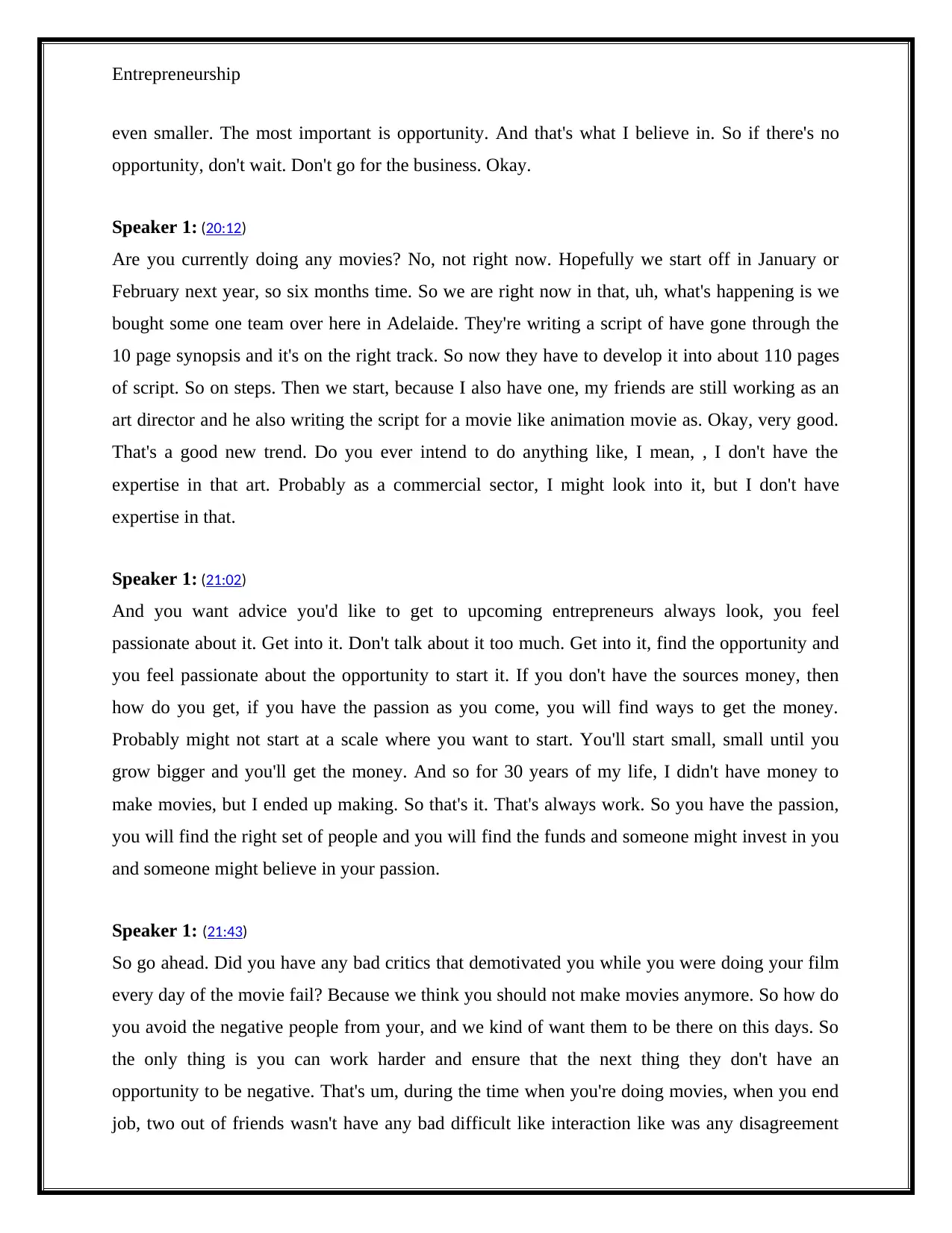
Entrepreneurship
even smaller. The most important is opportunity. And that's what I believe in. So if there's no
opportunity, don't wait. Don't go for the business. Okay.
Speaker 1: (20:12)
Are you currently doing any movies? No, not right now. Hopefully we start off in January or
February next year, so six months time. So we are right now in that, uh, what's happening is we
bought some one team over here in Adelaide. They're writing a script of have gone through the
10 page synopsis and it's on the right track. So now they have to develop it into about 110 pages
of script. So on steps. Then we start, because I also have one, my friends are still working as an
art director and he also writing the script for a movie like animation movie as. Okay, very good.
That's a good new trend. Do you ever intend to do anything like, I mean, , I don't have the
expertise in that art. Probably as a commercial sector, I might look into it, but I don't have
expertise in that.
Speaker 1: (21:02)
And you want advice you'd like to get to upcoming entrepreneurs always look, you feel
passionate about it. Get into it. Don't talk about it too much. Get into it, find the opportunity and
you feel passionate about the opportunity to start it. If you don't have the sources money, then
how do you get, if you have the passion as you come, you will find ways to get the money.
Probably might not start at a scale where you want to start. You'll start small, small until you
grow bigger and you'll get the money. And so for 30 years of my life, I didn't have money to
make movies, but I ended up making. So that's it. That's always work. So you have the passion,
you will find the right set of people and you will find the funds and someone might invest in you
and someone might believe in your passion.
Speaker 1: (21:43)
So go ahead. Did you have any bad critics that demotivated you while you were doing your film
every day of the movie fail? Because we think you should not make movies anymore. So how do
you avoid the negative people from your, and we kind of want them to be there on this days. So
the only thing is you can work harder and ensure that the next thing they don't have an
opportunity to be negative. That's um, during the time when you're doing movies, when you end
job, two out of friends wasn't have any bad difficult like interaction like was any disagreement
even smaller. The most important is opportunity. And that's what I believe in. So if there's no
opportunity, don't wait. Don't go for the business. Okay.
Speaker 1: (20:12)
Are you currently doing any movies? No, not right now. Hopefully we start off in January or
February next year, so six months time. So we are right now in that, uh, what's happening is we
bought some one team over here in Adelaide. They're writing a script of have gone through the
10 page synopsis and it's on the right track. So now they have to develop it into about 110 pages
of script. So on steps. Then we start, because I also have one, my friends are still working as an
art director and he also writing the script for a movie like animation movie as. Okay, very good.
That's a good new trend. Do you ever intend to do anything like, I mean, , I don't have the
expertise in that art. Probably as a commercial sector, I might look into it, but I don't have
expertise in that.
Speaker 1: (21:02)
And you want advice you'd like to get to upcoming entrepreneurs always look, you feel
passionate about it. Get into it. Don't talk about it too much. Get into it, find the opportunity and
you feel passionate about the opportunity to start it. If you don't have the sources money, then
how do you get, if you have the passion as you come, you will find ways to get the money.
Probably might not start at a scale where you want to start. You'll start small, small until you
grow bigger and you'll get the money. And so for 30 years of my life, I didn't have money to
make movies, but I ended up making. So that's it. That's always work. So you have the passion,
you will find the right set of people and you will find the funds and someone might invest in you
and someone might believe in your passion.
Speaker 1: (21:43)
So go ahead. Did you have any bad critics that demotivated you while you were doing your film
every day of the movie fail? Because we think you should not make movies anymore. So how do
you avoid the negative people from your, and we kind of want them to be there on this days. So
the only thing is you can work harder and ensure that the next thing they don't have an
opportunity to be negative. That's um, during the time when you're doing movies, when you end
job, two out of friends wasn't have any bad difficult like interaction like was any disagreement
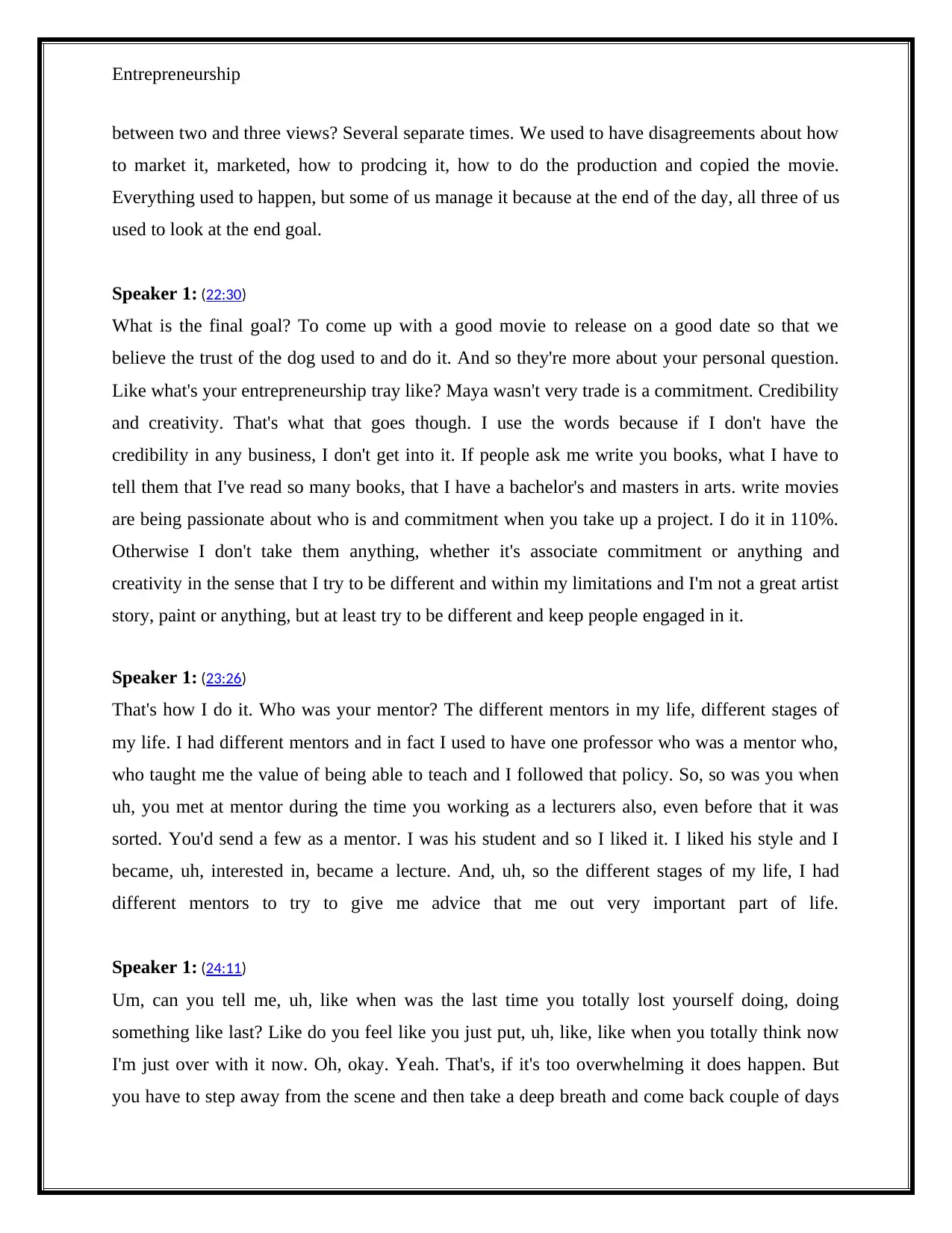
Entrepreneurship
between two and three views? Several separate times. We used to have disagreements about how
to market it, marketed, how to prodcing it, how to do the production and copied the movie.
Everything used to happen, but some of us manage it because at the end of the day, all three of us
used to look at the end goal.
Speaker 1: (22:30)
What is the final goal? To come up with a good movie to release on a good date so that we
believe the trust of the dog used to and do it. And so they're more about your personal question.
Like what's your entrepreneurship tray like? Maya wasn't very trade is a commitment. Credibility
and creativity. That's what that goes though. I use the words because if I don't have the
credibility in any business, I don't get into it. If people ask me write you books, what I have to
tell them that I've read so many books, that I have a bachelor's and masters in arts. write movies
are being passionate about who is and commitment when you take up a project. I do it in 110%.
Otherwise I don't take them anything, whether it's associate commitment or anything and
creativity in the sense that I try to be different and within my limitations and I'm not a great artist
story, paint or anything, but at least try to be different and keep people engaged in it.
Speaker 1: (23:26)
That's how I do it. Who was your mentor? The different mentors in my life, different stages of
my life. I had different mentors and in fact I used to have one professor who was a mentor who,
who taught me the value of being able to teach and I followed that policy. So, so was you when
uh, you met at mentor during the time you working as a lecturers also, even before that it was
sorted. You'd send a few as a mentor. I was his student and so I liked it. I liked his style and I
became, uh, interested in, became a lecture. And, uh, so the different stages of my life, I had
different mentors to try to give me advice that me out very important part of life.
Speaker 1: (24:11)
Um, can you tell me, uh, like when was the last time you totally lost yourself doing, doing
something like last? Like do you feel like you just put, uh, like, like when you totally think now
I'm just over with it now. Oh, okay. Yeah. That's, if it's too overwhelming it does happen. But
you have to step away from the scene and then take a deep breath and come back couple of days
between two and three views? Several separate times. We used to have disagreements about how
to market it, marketed, how to prodcing it, how to do the production and copied the movie.
Everything used to happen, but some of us manage it because at the end of the day, all three of us
used to look at the end goal.
Speaker 1: (22:30)
What is the final goal? To come up with a good movie to release on a good date so that we
believe the trust of the dog used to and do it. And so they're more about your personal question.
Like what's your entrepreneurship tray like? Maya wasn't very trade is a commitment. Credibility
and creativity. That's what that goes though. I use the words because if I don't have the
credibility in any business, I don't get into it. If people ask me write you books, what I have to
tell them that I've read so many books, that I have a bachelor's and masters in arts. write movies
are being passionate about who is and commitment when you take up a project. I do it in 110%.
Otherwise I don't take them anything, whether it's associate commitment or anything and
creativity in the sense that I try to be different and within my limitations and I'm not a great artist
story, paint or anything, but at least try to be different and keep people engaged in it.
Speaker 1: (23:26)
That's how I do it. Who was your mentor? The different mentors in my life, different stages of
my life. I had different mentors and in fact I used to have one professor who was a mentor who,
who taught me the value of being able to teach and I followed that policy. So, so was you when
uh, you met at mentor during the time you working as a lecturers also, even before that it was
sorted. You'd send a few as a mentor. I was his student and so I liked it. I liked his style and I
became, uh, interested in, became a lecture. And, uh, so the different stages of my life, I had
different mentors to try to give me advice that me out very important part of life.
Speaker 1: (24:11)
Um, can you tell me, uh, like when was the last time you totally lost yourself doing, doing
something like last? Like do you feel like you just put, uh, like, like when you totally think now
I'm just over with it now. Oh, okay. Yeah. That's, if it's too overwhelming it does happen. But
you have to step away from the scene and then take a deep breath and come back couple of days
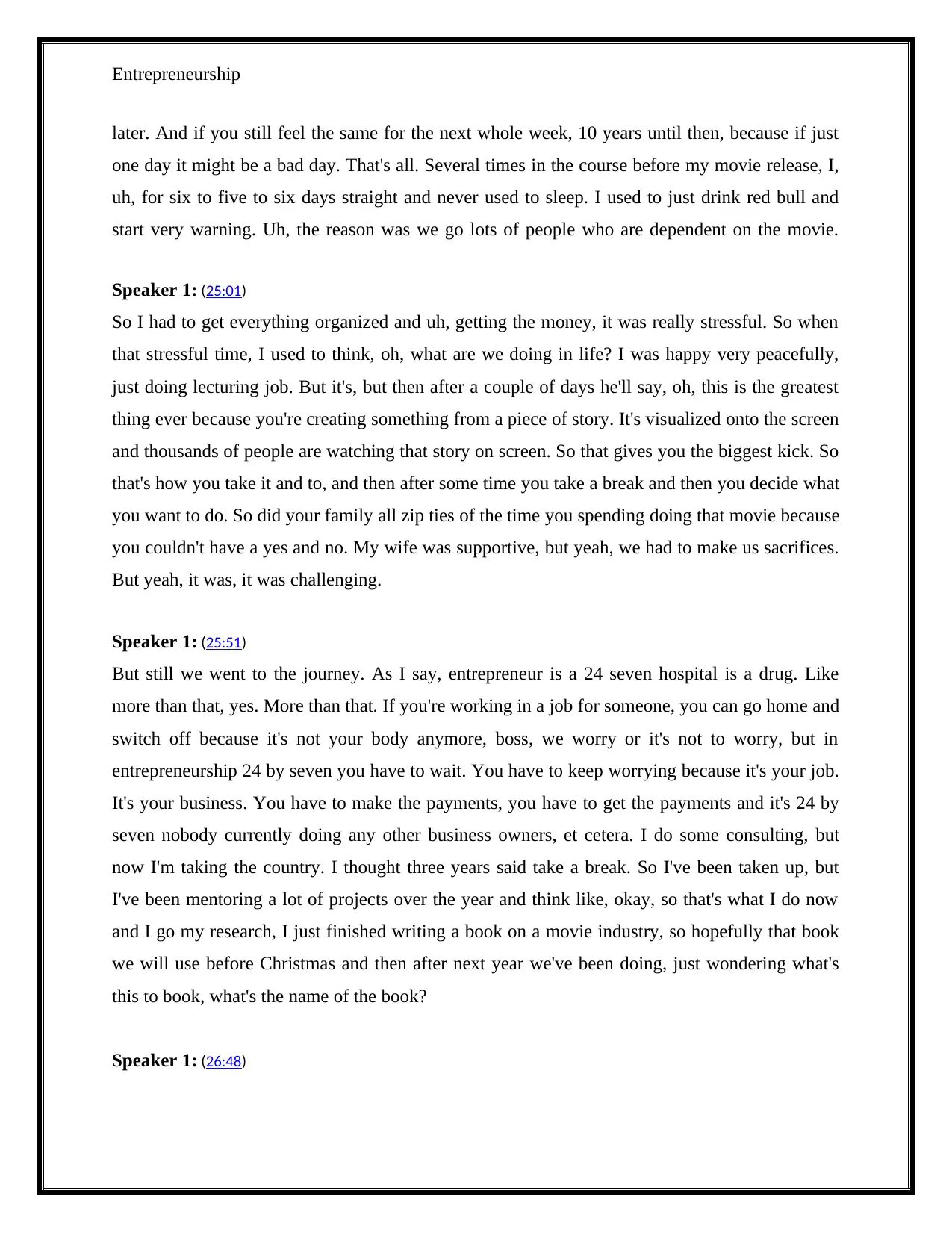
Entrepreneurship
later. And if you still feel the same for the next whole week, 10 years until then, because if just
one day it might be a bad day. That's all. Several times in the course before my movie release, I,
uh, for six to five to six days straight and never used to sleep. I used to just drink red bull and
start very warning. Uh, the reason was we go lots of people who are dependent on the movie.
Speaker 1: (25:01)
So I had to get everything organized and uh, getting the money, it was really stressful. So when
that stressful time, I used to think, oh, what are we doing in life? I was happy very peacefully,
just doing lecturing job. But it's, but then after a couple of days he'll say, oh, this is the greatest
thing ever because you're creating something from a piece of story. It's visualized onto the screen
and thousands of people are watching that story on screen. So that gives you the biggest kick. So
that's how you take it and to, and then after some time you take a break and then you decide what
you want to do. So did your family all zip ties of the time you spending doing that movie because
you couldn't have a yes and no. My wife was supportive, but yeah, we had to make us sacrifices.
But yeah, it was, it was challenging.
Speaker 1: (25:51)
But still we went to the journey. As I say, entrepreneur is a 24 seven hospital is a drug. Like
more than that, yes. More than that. If you're working in a job for someone, you can go home and
switch off because it's not your body anymore, boss, we worry or it's not to worry, but in
entrepreneurship 24 by seven you have to wait. You have to keep worrying because it's your job.
It's your business. You have to make the payments, you have to get the payments and it's 24 by
seven nobody currently doing any other business owners, et cetera. I do some consulting, but
now I'm taking the country. I thought three years said take a break. So I've been taken up, but
I've been mentoring a lot of projects over the year and think like, okay, so that's what I do now
and I go my research, I just finished writing a book on a movie industry, so hopefully that book
we will use before Christmas and then after next year we've been doing, just wondering what's
this to book, what's the name of the book?
Speaker 1: (26:48)
later. And if you still feel the same for the next whole week, 10 years until then, because if just
one day it might be a bad day. That's all. Several times in the course before my movie release, I,
uh, for six to five to six days straight and never used to sleep. I used to just drink red bull and
start very warning. Uh, the reason was we go lots of people who are dependent on the movie.
Speaker 1: (25:01)
So I had to get everything organized and uh, getting the money, it was really stressful. So when
that stressful time, I used to think, oh, what are we doing in life? I was happy very peacefully,
just doing lecturing job. But it's, but then after a couple of days he'll say, oh, this is the greatest
thing ever because you're creating something from a piece of story. It's visualized onto the screen
and thousands of people are watching that story on screen. So that gives you the biggest kick. So
that's how you take it and to, and then after some time you take a break and then you decide what
you want to do. So did your family all zip ties of the time you spending doing that movie because
you couldn't have a yes and no. My wife was supportive, but yeah, we had to make us sacrifices.
But yeah, it was, it was challenging.
Speaker 1: (25:51)
But still we went to the journey. As I say, entrepreneur is a 24 seven hospital is a drug. Like
more than that, yes. More than that. If you're working in a job for someone, you can go home and
switch off because it's not your body anymore, boss, we worry or it's not to worry, but in
entrepreneurship 24 by seven you have to wait. You have to keep worrying because it's your job.
It's your business. You have to make the payments, you have to get the payments and it's 24 by
seven nobody currently doing any other business owners, et cetera. I do some consulting, but
now I'm taking the country. I thought three years said take a break. So I've been taken up, but
I've been mentoring a lot of projects over the year and think like, okay, so that's what I do now
and I go my research, I just finished writing a book on a movie industry, so hopefully that book
we will use before Christmas and then after next year we've been doing, just wondering what's
this to book, what's the name of the book?
Speaker 1: (26:48)
Paraphrase This Document
Need a fresh take? Get an instant paraphrase of this document with our AI Paraphraser
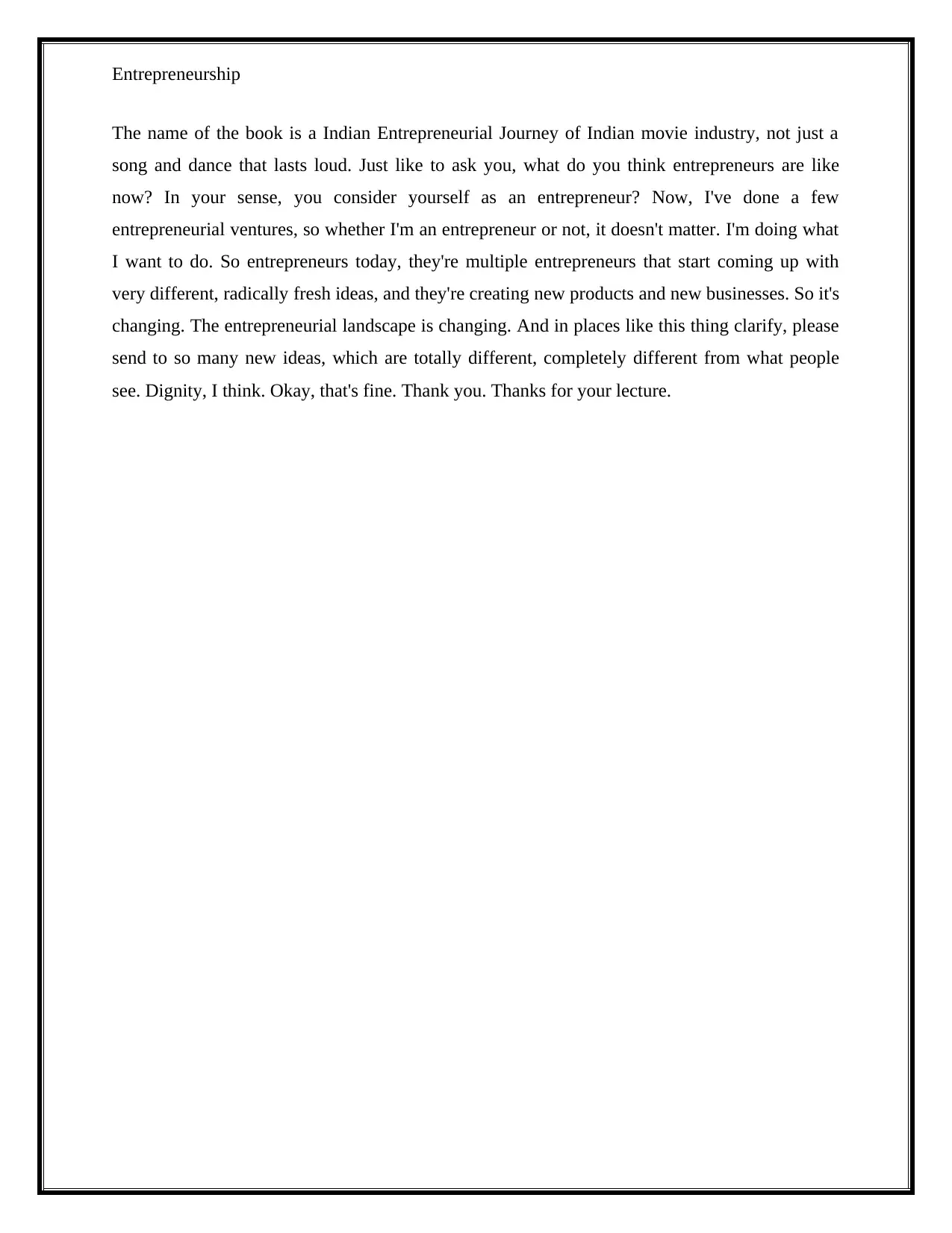
Entrepreneurship
The name of the book is a Indian Entrepreneurial Journey of Indian movie industry, not just a
song and dance that lasts loud. Just like to ask you, what do you think entrepreneurs are like
now? In your sense, you consider yourself as an entrepreneur? Now, I've done a few
entrepreneurial ventures, so whether I'm an entrepreneur or not, it doesn't matter. I'm doing what
I want to do. So entrepreneurs today, they're multiple entrepreneurs that start coming up with
very different, radically fresh ideas, and they're creating new products and new businesses. So it's
changing. The entrepreneurial landscape is changing. And in places like this thing clarify, please
send to so many new ideas, which are totally different, completely different from what people
see. Dignity, I think. Okay, that's fine. Thank you. Thanks for your lecture.
The name of the book is a Indian Entrepreneurial Journey of Indian movie industry, not just a
song and dance that lasts loud. Just like to ask you, what do you think entrepreneurs are like
now? In your sense, you consider yourself as an entrepreneur? Now, I've done a few
entrepreneurial ventures, so whether I'm an entrepreneur or not, it doesn't matter. I'm doing what
I want to do. So entrepreneurs today, they're multiple entrepreneurs that start coming up with
very different, radically fresh ideas, and they're creating new products and new businesses. So it's
changing. The entrepreneurial landscape is changing. And in places like this thing clarify, please
send to so many new ideas, which are totally different, completely different from what people
see. Dignity, I think. Okay, that's fine. Thank you. Thanks for your lecture.
1 out of 20
Your All-in-One AI-Powered Toolkit for Academic Success.
+13062052269
info@desklib.com
Available 24*7 on WhatsApp / Email
![[object Object]](/_next/static/media/star-bottom.7253800d.svg)
Unlock your academic potential
© 2024 | Zucol Services PVT LTD | All rights reserved.
